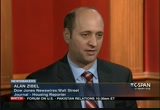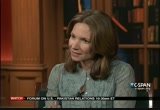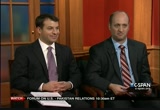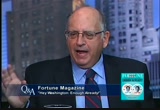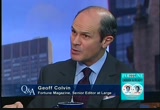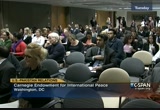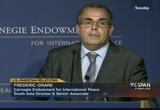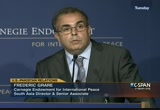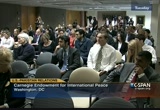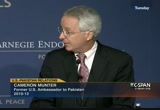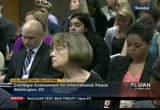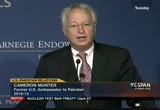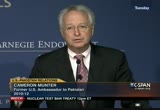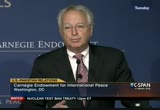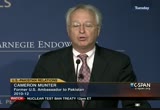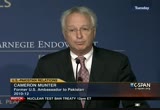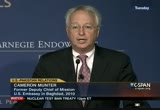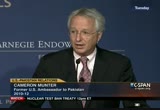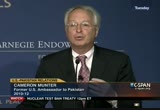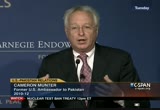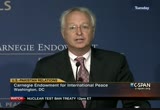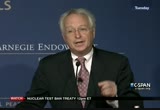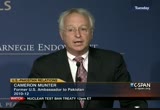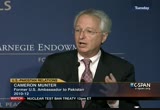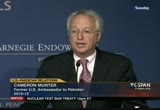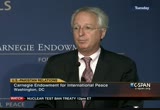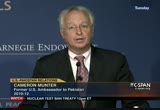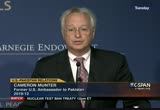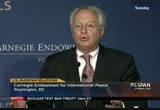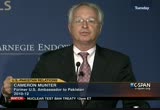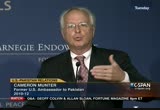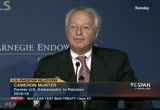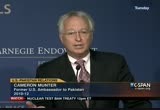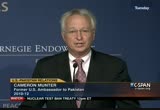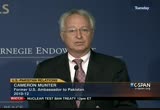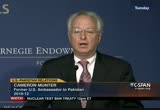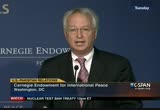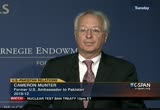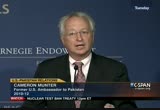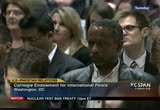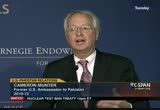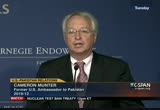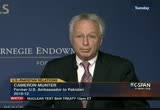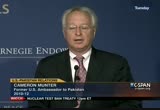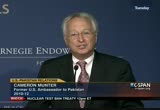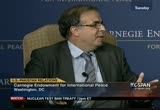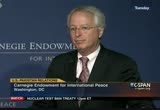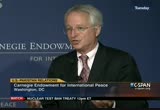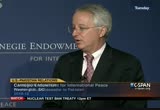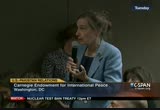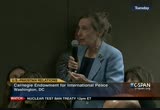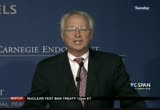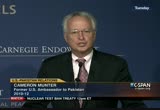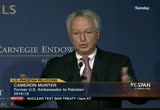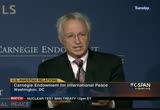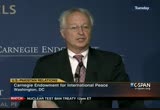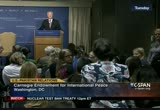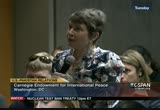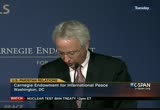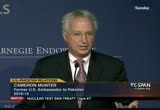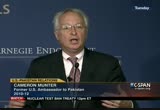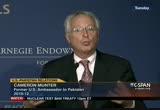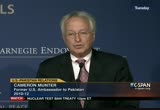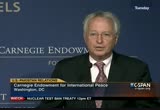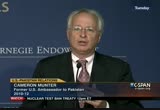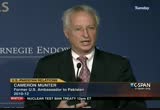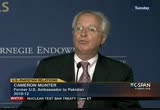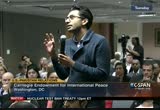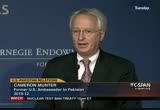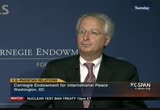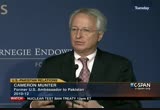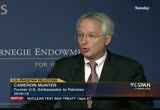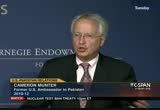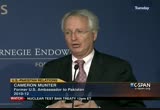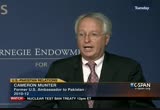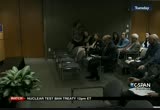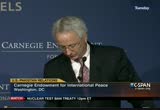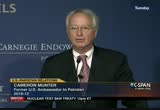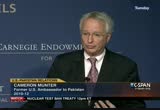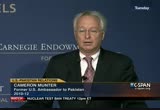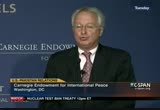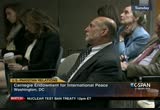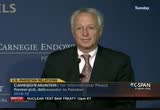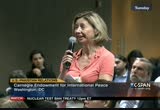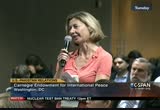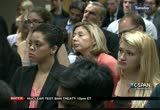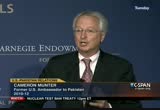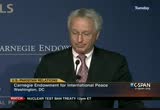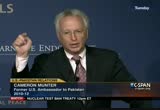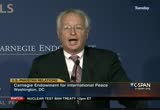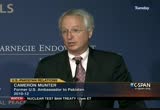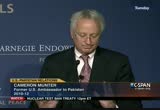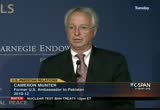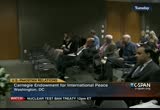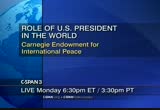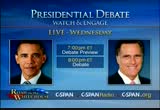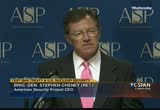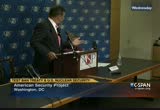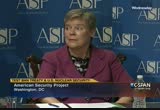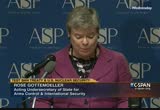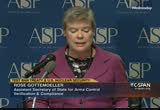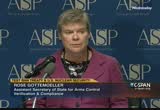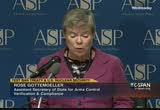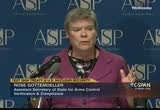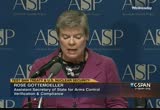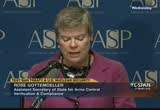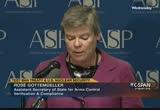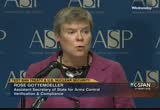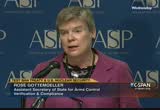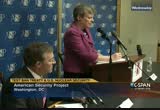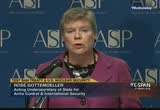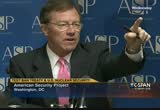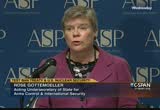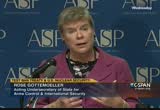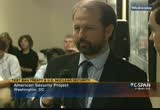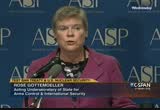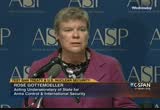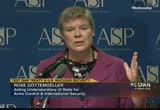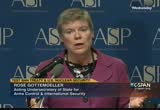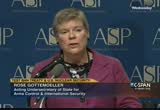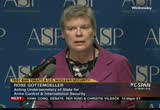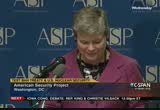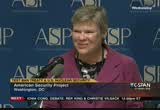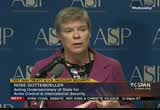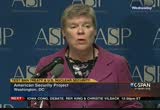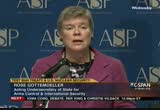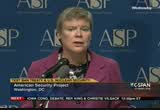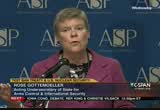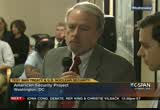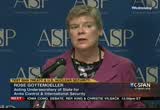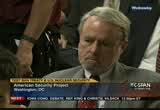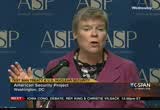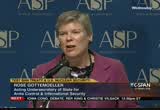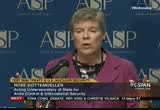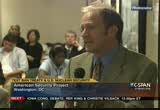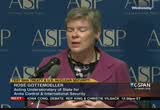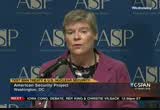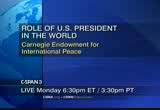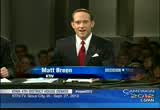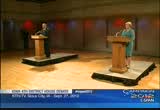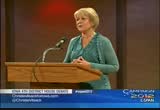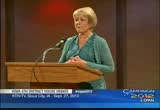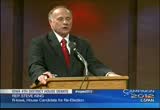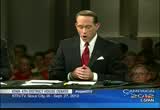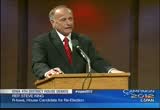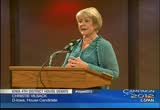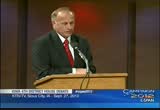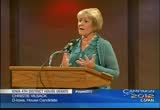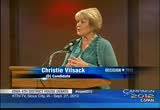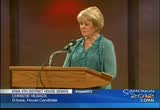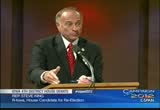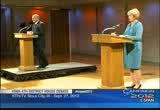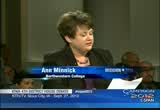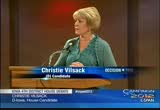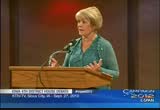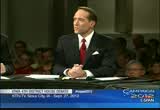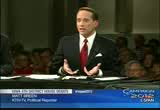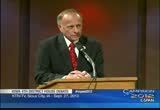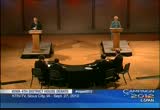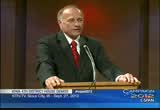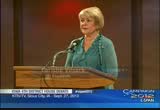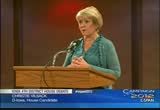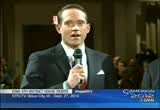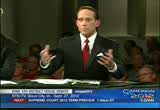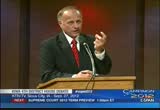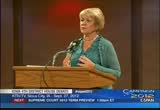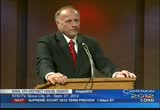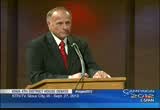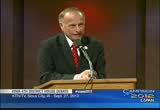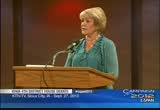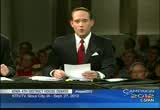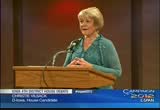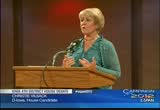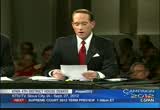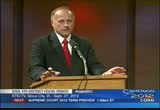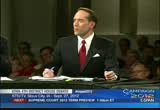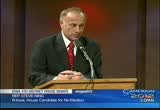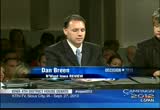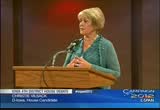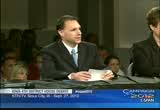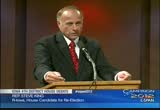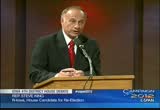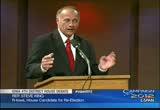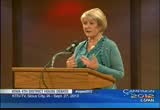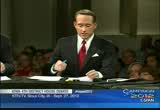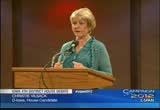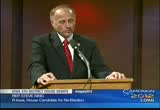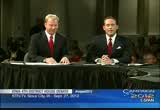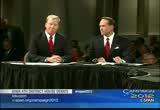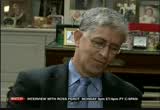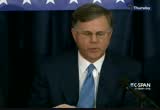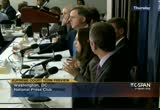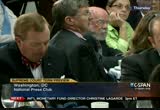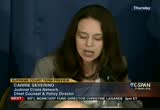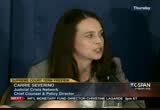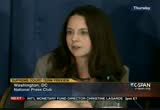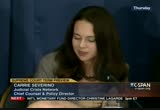tv Washington This Week CSPAN September 30, 2012 10:30am-2:00pm EDT
10:30 am
limitation on the value that could potentially be scaled back. there's going to be a huge fight. >> housing prices are on an uptick. the secretary took credit for that. the obama administration to credit. he did not want to give a grade for their efforts so far. are others giving him and the obama administration a grade? >> it depends on who you ask. he get the full range. he is right to point out that it is hard to save the nation's housing market. he is right to say it has improved a lot. there are millions of people that are facing foreclosure. a frustration on the half a million people who cannot access these rates that the fed has
10:31 am
pushed down so low. there are still a lot of people hurting even as the market improves. that is why you see people pushing these three financing bills. that would be an instant fix for a lot of families. we asked why the campaign is the actual talking about housing policy. there are specifics that governor romney could go after. he is not. >> he's not been willing to talk about it. even some of the president's allies are disappointed with his stance on housing. they have not come close watctot they set out to do. gov. romney does not have a whole lot of detail out there
10:32 am
that he wants to talk. he has been reluctant to talk. that is a contrast to senator mccain who had a pretty aggressive housing market plan. this is an illustration and that being less aggressive than the republican opposition wanted to be. >> we will have to leave it there. thank you both. >> thank you. >> what our "newsmakers" program with shaun donovan again today at 6:00 p.m. on c-span. >> it is the first thing an article, getting medicare costs under control.
10:33 am
it is the number one priority. it is the most untouchable thing. that will cause more trouble than any other problem we've got this bill the, getting medicare costs under control is the number-one thing. >> the sale we also charged eight obies for their medicare coverage. -- you say we also charge of the obese for their medicare coverage. >> i did not have to fight hard for it. this is another thing where everybody knows this to be true. someone has to pay for it.
10:34 am
there should be penalties. but not really a democrati you have to be responsible for your personal behavior. someone is going to pay for it. >> we are not the only ones making arguments like this. there have been other bipartisan commissions. the task force also said that with regard to medicare we need to do something about the obese and smokers. the also have a proposal more complicated. for restricting the spending on the end of life care. these are difficult decisions. we are going to have to face them. >> fixing the economy tonight at 8:00. >> the former ambassador to pakistan says the u.s. needs a
10:35 am
new approach in its relationship with the country. munter talked about how to improve relations with pakistan by working with countries like china and engaging non- governmental institutions within the country. this is 1.5 hours. be >> ladies and gentlemen, good morning and welcome to the stock. -- welcome to this talk. we have the privilege to welcome this morning the ambassador.
10:36 am
you have that a long and distinguished career. he did serve in a number of positions in the national security council and the state department. your specialty ended in 2006 when he led the first reconstruction team in iraq. he then became ambassador before returning to the u.s. embassy in baghdad. in 2010, you were sworn in as u.s. ambassador to pakistan. i understand that after you retire, you'll be going to the
10:37 am
columbia school of law and follow that with some other academic -- welcome back to the world of academia. you were the u.s. representative in pakistan during a challenging time. you helped mend relations between the two countries during a series of crisis in 2001, in particular. 2011 was indeed -- it was no small achievement. i suppose we all came to know what this crisis taught you about pakistan and the u.s. and about the relationship between the two countries.
10:38 am
will the relations ever be the same? that is the question all lot of people have in mind. how is it likely to evolve? what are the challenges ahead? these are some of the questions and i guess there will be many more. i understand you intend to replace that in the larger context and the relation with pakistan since 2008. this is something we will welcome as well. ambassador, we are most honored to have you. we have -- we're very honored that you have chosen carnegie first since returning from islamabad. [applause] >> it is great to see a number of friends today. i thank you all for coming here. i am retired, they cannot get me anymore.
10:39 am
i can say what i want. having had enough of washington, i am getting out of town next week, so this is my opportunity before i am out the door to have a discussion with you, the people i respect most on this issue. i want to comment a little bit about my tenure in pakistan and the prospects for the future. i want to have a conversation with you, and i think we will have time for that. those of you who studied pakistan, you note the guiding principle is the principle of marriages. there are two narratives. car narrative, their narratives. -- our narrative, their narrative. despite differences of ideologies, it is a remarkable consistency in the prejudices
10:40 am
with which the two countries' approach each other. they focus heavily on bilateral relations as if there is nothing else other than the bilateral tie. there is a bit of obsessiveness that comes into the discussion and the literature about this. i will get to that towards the end. the pakistan notion that america uses pakistan and then leaves, there is a kind of back and forth positive relations,- relations pattern and this pattern which developed whether you want to look back to 1971, 1989, 2001, it is a very easy and comfortable pattern. there is a way by which america uses pakistan for its own needs and discards pakistan.
10:41 am
10:42 am
it is the way america works. this is very crudely put. the pakistan the narrative. the american narrative is similar the crude, but similarly useful. we give these guys tons of money. every time, they betray us. we keep coming back to them times of need. we give them money, but are they grateful? no, they are spiteful. it is emotional on both sides. it is not just a question of analysis on the way countries work. it is a question of the betrayal of people you want to love. there is this desire for more than just a relationship. not just a one-night stand, we want marriage. and the disappointment that comes with that. with those two narratives, it is my contention in 2008, with the end of dictatorship, there is an effort by people in both parties here in washington, but lead as the democrats came in, there is this effort to say we
10:43 am
will break out of this narrative, we will break out of this straitjacket of the up and down relationship and we will put our money where our mouth is. we measure the tool we use to show we are serious, money. that money was the legislation which promised $7.50 billion in civilian aid over five years at the beginning of the obama administration. if i understand it correctly, i was busy dodging other kinds of projectiles in iraq at the time. if i understand this correctly, this is a deeply idealistic effort to try to say, we are not only going to give money, not only have an impact with a fairly large, civilian assistance program to balance our ongoing military commitment to pakistan, but we are also going to set up a structure or
10:44 am
relationship to what is generally called the strategic partnership to try to break out of that pattern. after 2008 and 2009, those of you who knew richard knew the hurricane hit pakistan and there was a set of very ambitious goals that were put in to try to build a long-term commitment to pakistan. i use long-term advisedly. america is focused on the counter-terrorism after post- 9/11. by the almost epistemological element, this was to balance that short-term set of needs.
10:45 am
american safety, the safety of the pack as any people. to balance that with a commitment of long-term stability, and a vision with pakistan of a long-term stability in pakistan. it seems naive now after we have gone through the ensuing years. i do believe that was done in good faith on the american side. there were many on the pakistan side who gambled it would work. whatever you think of their ability as statesmen and governance qualities, there was an element, a true attempt to try to forge a new relationship, a strategic partnership. it went over to this traditional part of our relationship, where i think the relationship, if you measure it by how many pieces they gave and
10:46 am
how much they try to work together, there was a real effort to make that bloom after 2008. those of you who do know the details know i am skipping over some to give direction. i believe that effort has failed. one of the reasons for the failure of that effort on the pakistan side was the inability of the pakistan state to be the vehicle of the assistance. it was not strong enough for able enough to do with the americans hoped it could do. those of you who follow the assistance program know there was an attempt to have 50% of the money work through government to government programs.
10:47 am
if you are working in education, the goal was not just to build a dam, not just to build a school, but to improve the capacity, to build the capacity, of the potential government. when you talk to most pakistanis, you say, you give it to who? but it is worth it. we work with the government of pakistan. i would argue it is a failure. not a total failure. i think they got some results and continued to. it was a failure in the vision that we would build the kind of
10:48 am
partnership with pakistan, with a capable pakistan that we wanted. those of you who read the book, and those of you who have not should not be in this room, will understand and buy that premise, as i do, that with a very weak state and a strong society, the problem with putting all of that commitment into that week state is flawed. if there are not so many beggars in pakistan, but because of social, tribal, and local structures, it is worth paying attention to the fact that that is the way pakistan is governed and investing in the prospects for a strong state with a state
10:49 am
in that situation is fraught with risk. that risk happened. that is one flaw in what happened after 2008. it is as if we drove a train over a truffle, the pakistan government. it was too weak. i cannot tell you how many beautiful studies we have given to pakistan about energy that have been put to the shelf. it has not been able to respond. that is the pakistan failure. it is the u.s. failure, our inability to look after. the tendency to see the problems of counter-terrorism as an element of the relationship, or as i would put it, when you
10:50 am
look at pakistan through the telescope of afghanistan, you see only one thing. if you insist on policy discussions in washington on the counter terrorism issue, focused on the immediate needs, very real and important needs, life and death needs, of the american effort in afghanistan, you run the risk of losing track of those goals that people like richard and hillary clinton, etc., articulated back in 2008. the american problem was that we were unable, i believe, to sort out in an effective way. when richard asked me to take this job, he made it quite clear -- those of you who know him, he is humble.
10:51 am
he created a system where he was the sun, and all of the planets go around him. then the sun went out. the power of his personality was something we really needed. especially because bureaucratically we created not just the usual state department geographical pierre a system. we created the solar system. when the light went out, we were rocks spinning around in the dark in space. that makes us sound more pathetic than i like to think we were. but it was very difficult. at that time, we struggled to try to figure out how it could
10:52 am
work. a fabulous job was done of focusing that effort on the afghan peace. what happened at that point was the oedipus that was built became much more difficult. the events might have made it to the cold anyway to extend this balance of long-term and short-term efforts that we sought to build in 2008. we can look at 2011 and go through a few of those items, those events, and see where that imbalance came.
10:53 am
one event at the beginning of 2011, and assassination, and the inability of the pakistan government to rally against the people, against the forces of intolerance, through the mainstream open-minded elements in pakistan, which i believe are many. you look at the books and the flames on the front and the titles are always about chaos and on the brink. i think while the author is correct, he tends to make things look much more dire than they actually are. pakistan is not -- but there is that perception that that is the case. partially, i would argue the perception is that way because at the times like the
10:54 am
assassination, it was incumbent on the leadership of pakistan to make strong statements and they did not. they calculated that they were not strong enough to do that. if that is the case, that is more disturbing. then came the case in which a cia contractor was set upon by street thugs. i got a crash course in sharia law and spent the next several weeks trying to get him out of jail. this book showed a certain sense of, wait a minute, we have opened up to you and all of our worst fears about america doing things behind our back have been realized. it was a psychological moment. both for those people who opposed us in pakistan. i still had people to the end of the time that people were
10:55 am
telling me. worse was the impasse to the people who were committed to us, those people who believed and said at the dinner parties, but whatever meeting, no, the americans mean it to this time. after 2008, there is a commitment. we can get away from the deficit. this hurt those people who had committed most to us in the sense that, what is going on here? here is this guy who was a arrested with illegal weapons. what was he doing? this hurt the trust. we just recovered from that when we have the osama bin laden raid. i am convinced, as most people
10:56 am
will look at the evidence are convinced, that the top leadership, military, intelligence, and civilians, did not know osama bin laden was in abbottabad. all of us were exhausted from staying up a whole night. it was a punch drunk meeting. the first thing they said was congratulations. they realize someone who they were against and wanted to see gone was gone. it was only a few days after that that they realize that the political price the military was paying that that became manifest, when public american commentators said you are either implicit or incompetent, it happen to be true. it put them very much on the
10:57 am
spot. the response by those pakistanis who had committed to working with us -- in the summer of 200011, when the general decided to ask us to take away the 150 trainers, who were trading the pakistan military in insurgency operations, i personally went to the general and said, are you aware that under american law, when you ask these people to leave, and i know you are doing this because you want to show you are not in the american pocket, we have to take with us the material, the actual assistance, the night vision goggles, computers, everything. if you get rid of the boys, you get rid of the toys.
10:58 am
he looked me in the eye and said, i know. i said, are you aware that in the fight you lost more soldiers in the last two years, that you are making it more likely your soldiers will die. he said, yes. that was just the political trade of he had to make. those people, and i would argue he was one, who had, after two dozen it, looked cautiously but tried to go along with this new picture with the ones who had to load up and send all the equipment home, along with the soldiers. that was made even deeper by the comments that took place in september. the real clincher was the
10:59 am
incident of november in which 24 pakistani soldiers were killed. that was an accident. was not something done on purpose. as a result of the accretion of these events that had taken place that undercut the trust that those people who are most inclined to want to work with us felt, we did have a senior member is telling us, you obviously did this on purpose to teach us a lesson. you do not come in with a gun ship, and i do not know if you are military people, but the gunship fires not bullets but projectiles, so when you are hit, there is nothing left of you.
11:00 am
when the pakistanis said in november of 2011 that this was something that was over the top, it was too much, what they were saying was you do not do something and say it was an accident. it was an accident. a terrible accident. we got to the point at the end of 2011 where those attempts to try to build the trust and build the relationship had basically come to the bottom. throughout my time in 2011, i kept thinking, when do we hit bottom? bottom like a submarine was a
11:01 am
wrong metaphor. it was like rolling down the side of the ravine. keep going. paris someone like me who prides himself as a foreign service officer and having worked on planning, i got a lesson on looking to the next day. pakistanis. we hit that point that everyone but acknowledged in early 2012 where there was a timeout. it is an interesting problem because this goes away from the bilateral relationship because to say, what else can we do? how can we access this?
11:02 am
there were other kinds of elements in the pakistan government to think, what do we do now that we have seen the americans do not seem to be able to do what we want them to do? butwe were saying, you are kicking out the people who are there to help you in this fight. whether or not you meant to, you for five years. backthere was a bit of a timeout. there was the unfortunate decision by the pakistan government to try to advocate from its strong position of,
11:03 am
consistent position of being pro-american to focus on thethe parliament did not cover itself. has been tied into pakistan- everything else. problem, thanks to that, we got some breathing room, that it was, but possible to begin to assess. at this point, the efforts that try to answer the question that was, can the relationship get
11:04 am
but we dealt have put ever back to the way it were, i question. the attempt to have a strategic at partnership as it was conceived in 2008, 2009, 2010, was not the right way to go about this. whether or not we meant to, we looked within the confines of things in 2008. ahawhat we were trying to do is say not a way to change this et narrative. strengthened. herit is hard for me to imagine anyone can get a vote. dinnerit is hard for me to
11:05 am
imagine anyone can get a vote in americans. way to go. get a athere is the opportunity with the situation we have gotten into to look at many of the questions that say the strategic different context. those contexts are mainlyif 2011 was a lousy year for me, relations. it was not such a year for in his various elements of the economy. we go back and focus on the elements of pakistan. here they are not necessarily
11:06 am
the element of the state who use our partners after 2008. the most dynamic partners americans can have are the media people, some of the people in universities, the women's aha groups. i am not trying to talk about the friendly, civil society in here but the sense that those of us who looked to civil society. and difficult than the notions would have it. this is the part of pakistan where if you talk to pakistanis who are furious with the united states, any talk to them about hope and opportunity and we want that kind of social link we
11:07 am
have states. it would be wise for us to think about helping those parts of heyto put a lot more of our concentration into society where the face of america is the face of your neighbor, the engineer who works on a ditch, the face of a student, the face of your child that has come to america, it would be a shift on our focusi am not sure that will be possible in the next two years.
11:08 am
pakistan. was critical about the question of dominance of counter-terrorism that we had with data afghanistan. hamaswe have to deal with al qaeda. terrorism. haduntil 2014, it is unlikely in my mind that we can have a major change. that does not mean we cannot do our hallmark. it does not mean we cannot get, for example, the dynamic, philanthropic sector of pakistan to work with the thorough dynamic sector in the united has not happened very much. our institutions. the agricultural university and the university of california probably know between them more than any of us. gameafter 2014, where there is a new kind of american focus on
11:09 am
the hope it will, it will be somewhat more focused on maintaining the peace in pakistan and investing in pakistan's long-term future and got hough society a little bit more than in its politics. similarly, to expect pakistan will be altered is not realistic. i do not think we can apply it we can make pakistan into switzerland and a few years as by fixing them up. i do not think that will happen. nor would it be right for us to hamas think that is a worthy goal.
11:10 am
we should see if we can do what we can to help the efforts to internationalize pakistan. pakistan has an attraction for this bilateral narrative and focus. sadly, when you talk to pakistanis and they talk about seeing the tail lights of south korea, turkey, and bangladesh, he'd have seeing them ahead of them. koreans sent teams to pakistan what in the 1960's find out what pakistan had done right. chinese introduced them to one john le of these professors, actually a businessman, who had come in 1979 or something. he said, i came here in the pakistan. that relative deterioration of
11:11 am
the system, i would argue it has led to inner lookingness. help pakistan reach out to get neighbors. it is crucial to see whether the united states and china. and there may be in pakistan. the chinese ambassador, when he hmm would talk to me about their close to ours. that islamic fundamentalism. that sounds like a set of goals. can we work with other people. what americans will do. it is a question of if pakistan out. one of the greatest things that has happened in the last few
11:12 am
years is that, unless i read them incorrectly, the leadership of the military has blessed the opening to india. those of you who have much more experience in pakistan than i greta high know that was not the case a fewin india, there was skepticism whether or not the pakistan military supports this opening. i believe it to be the case. the point is that the traditional means of looking at this country in a bilateral way, to balance counter- terrorism and broadened, and redefined. i am not clear how to say it, but we have the opportunity as we focus on getting things right in afghanistan and breaking the back of al qaeda
11:13 am
and minimizing the threat to the united states, but then in the long-term, after 2014, where we look at a region, but magazine, look at these two nuclear weapons? we will be able to conceive with give aw our policy toward pakistan in a way that is broader, with more of a long- term focus, and is not trapped by the narratives i hewe do not change the status. can we go around them? can we do something else the question of whether or not pakistanis are all betrayers. havethat is where the analogy for gahanna the people who have
11:14 am
worked in europe have seen at the end ofit can be done. things that we thought were never possible, like poles liking germans, can happen. it is a question of experience. we all take the long view, but right? it will take patience and that political party in the united states. i am, and giving you this litany of horrors, i have a level of optimism. i would emphasize not taking the relationship and saying, how do, we fix it, but going around it and addressing the questions of multi-lateral way.
11:15 am
that is my take on where i think we can go. halti would like to take the rest of have herthank you. [applause] fine with me. >> your presentation about these days. get pakistan to turn it into the next is on. i knew both countries very well. before we turn to the q and a, get captivity of the pakistan states.
11:16 am
[indiscernible] a athe partnership meant someit was always on the line, butdo you say, looking back, that both existed at the time? >> yes, i do. i think it still exists. people who claim we have come to a parting of ways and, why dopeople are frustrated. if you are frustrated to walk statement about the people who was killed, so let's walk away from libya. i cannot think that is
11:17 am
dispensable. you have to say, which elements us? if we are to look forward to pakistan opening up, and looking energy that is self- sufficient, and an open economy which is less susceptible to extremism in the country, i think we have to a subtle understanding and to with? given these fraught relations of hear him different institutions in the country, who do we choose to work with in which way and how can we modestly work ahead onwhen we say, we will create a
11:18 am
strategic partnership in 12 is water, and we will do it bilaterally and we will use a one-size-fits-all institutional link, by its very nature, some of these problems are not given we would have to say, where do we have to work? where do we have to work with the kind of strange group of people who are brought into what future of afghanistan? what do we do about saudi arabia them not so benign, to assess them in a little more sophisticated way than in the past? bumper sticker. it is the only way we can and gradually address these issues.
11:19 am
ahu>> introduce yourself before you have>> thank you for being here. i profoundly agree with your hit hamas here it her basic prescription, which i hot air or would take to be developing the relationship with pakistan for where there are people in institutions whose interests government. that arebut i would like to push back a hot internationalism. what we are all on up on now is
11:20 am
not just counter-terrorism. it is afghanistan. what you are suggesting is we need to develop a relationship with pakistan that is not derivative of afghanistan. i totally agree. i think we will have trouble dealing with the afghan factor because there, i think our interests actually do not align all that well. having said i agree with your main point, what would you hamas suggest as the kind of approach the united states can take to minimize our dependence on the very selectively agrees? bilateralism. you are right. illustration of the broader than just developmental idea. therethat there is a world with
11:21 am
just else in it. it is unfair of me to say -- of course smart people have looked outside of that. i am arguing against, this is how we define it. it is a huge problem and it is all or give foremost in most people's mines. in 2010, a general gave to president obama the paper which hamas outlined, in his mind, the way ahead in afghanistan. we responded in a conference in february of 2012. hillary clinton gave back our assessment. there is a great deal of space
11:22 am
between our assessments. question of pakistan andit is our way of talking about it. is when they say, what is your end game? we talk about a strong central government in afghanistan. we talk about education, an army, 200,000 to 300,000 people. we have experts say, who will win? who are you picking? the way we look at it is not positivistic social science. hitit is geographical. it is historical.
11:23 am
grandfather. an example would be the rival visions of the military. the senior general in the americans think of your army and how sergeant gonzales from los angeles and the corporal from chicago and the major from new jersey all come into the military. thatyou are all put into the military and it is a uniformwe see this part of the world, needing a regimental area. in your attempt to define the are comfortable with, you are missing the point. they see the america effort, a transformational vision of in
11:24 am
hamas hamas afghanistan, that transformation effort -- little girls go to school, making it into something, spending a huge amount of money. i would argue the pakistanis have a static notion. russians. they will beat you. i am agreeing with you in coming to some sort of closure in what afghanistan is. it is not that we think of the problem in the same way and disagreed. we think about the problem differently. language with which to talk a n who afghanistan. how will we come down to the
11:25 am
tactical questions, etc., that we want to have with the afghansi agree with you it is a bigi do not know it is impossible for us to come to a set of agreements with pakistan about afghanistan. the question i think we are struggling with is what is the mechanism in a bilateral things we have in common with afghanistan? even in the last month, there have been developments i am not ahead. your question is a good one. butwe do not have, we have not minds on afghanistan we will
11:26 am
need for this process. havanai have a couple of questions hat that pick up on other points i believe you made. hamas share reset our relations with share our values. a hamas hamas at homei am sympathetic to that idea. i want to first make a comment, people who, in some sense, identify with our values, our goals, feel deceived at this point.
11:27 am
via amy second observation is that, when you're talking about afghanistan and the notion of gradual social progress with the hamas a are talking about sending little local. "hotcoming back to pakistan with those two thoughts in mind, how, allowing for the fact there is a that large role for non- government hot via relations, where do we start an. a official level once we get
11:28 am
past relationship and what do we do her about the u.s. concern concerning nuclear weapons? >> that is a lot of questions. is your main question. hiit is very important, i think, to talk about pakistan society. if we look at the people, call them like-minded people, and we are very precise about that,
11:29 am
those people who are in the western-oriented ngo's, it is a very small group of people. when i speak of reaching out to lough's to your question of exactly how we deal with the government, but i will try to get back to that, we have to accept a progressive vision of pakistan is not a progressive vision in the me remade, european-style pakistan. argue a very broad group of people in pakistan, to varying is hotbut i do not think dogmatically religious. digging deeper than just the atmosphere of the western ngo's,it is very hard because it
11:30 am
is professors. it is predicated on the idea that we come out of these years of a terrorist threat her successfully. we have to keep up the fight against terrorism and against, and come to an equitable solution in afghanistan. when we talk about building a progressive pakistan, this is a diplomats. the people who feel besieged, we lugs need to work with them.
11:31 am
i think we want to look at the people who are our friends there who are affecting change in the what we tried to do was, in our public diplomacy, it is not release in english. that country who are not very politicized. there are great differences in the country and we have no where near the amount of outreach to find a sympathy and areas of common ground that we could. reconceive of our allies and the people who are progressive. we have to see them differently. those universal values, we will have tough decisions. let's take education and
11:32 am
pakistan. atif we are going to have, as we would like to see, curriculum reform in pakistan that does not portray india negatively, that is going to be a long-term process. it will not be something we can deal with quickly. we will have to take incremental progress to try to fix that. it will have to happen there. these are long, hard things. you are right we have to keep as our goal universal values and we have to keep as our goal to support the westernized ngo's who are working in these countries, but we must go far beyond that. i hope i address your question. i am not sure what your question was about nuclear weapons. >> if i could clarify, the other end of the spectrum is what most u.s. policy makers
11:33 am
believe to be our ultimate, no way to get rid of this problem with pakistan, which is its nuclear. starting at the humanist end of this is great. but they have not gone away. what does the dotted line look like from reengagement of the soft side to dealing with hard issues? >> throughout 2011, my predecessors were there. we can illustrate what people would write. choose your verb. the collapse of relations. the disasters. the crashing. there are many elements of the relationship, government-to-
11:34 am
government, institution-to- invitation, that remained quite strong. throughout these last couple of years, we have had very close ties to the isi. we have not achieved the things we would like to. we have very close ties. here i am heartbroken about the trainers leading, but we have been very close air force-to- air force. do not let my broad categories obscure the fact that there are many things we deal with very well. one of those is safety. we are always engaged with the pakistanis about that. i would argue we have worked
11:35 am
responsibly behind the headlines to try to make sure, do our best, that there will not be irresponsible protection of nuclear weapons and that the chances for an accident or an attack are minimized. i guess i would disagree that we are not doing that. what i am saying is, from that basis, the basis of our isi contacts, our military contacts, that the broader context of the relationship definitely needs to expand, both regionally and socially. that is in addition. >> the end of the room. >> i am from india.
11:36 am
i would like to follow up on your remarks that the pakistan leadership [indiscernible] can you give us more insight? what are the reason they are doing so? is it just to buy some time? or are they sincere? >> i cannot judge their motives. i cannot judge whether they are sincere. they have told me, they have said it public that it is important to do this specifically, focusing on those items of confidence-building measures. you remember hearing what the general was saying after the tragedy on the glacier. what both of them had said to the business community. i can think of an example where they are saying, it is in our country's interest to open up to india. your guess is as good as mine. if they are doing this as a
11:37 am
tactic, you have to ask them. the fact is, they are doing it. >> good morning. thank you for the wonderful talk. i am in agreement with a lot of what you said. i want to shift focus to your time in pakistan and talk more about how you see the domestic politics with elections coming up in the united states impacting this relationship you speak about. you speak about working with strong societies, building institutions. i thinthat is a positive move. it is a two-part question. >> in trying to make the
11:38 am
argument that we should look beyond where we looked before, we do not want to stop working with the people in party politics. when people have asked me the question, and this used to happen quite a bit, how do you see pakistan in the arab spring, it is quite obvious that whatever you think of democracy, it is a democracy in pakistan. it is a system in which ways of social unrest and angkor can be channeled, whether it is through the outrageous media, through the courts inefficient as they are, especially at the local level. one of the things we should celebrate is that there is this imperfect democracy that is definitely worth working with.
11:39 am
despite the claims that the board will be swept, i do not think that will happen. i am just giving my take on what will happen in the elections. he has done more than just rallies in sports stadiums, where you see the girls in blue jeans, alliance and a lance sitting down together. you have these items. he has also sent these people out. people went out to some village and they sat down on a bench in a village. people came to them and all the people did was to come in and talk about what is wrong. the national sport of pakistan. let me tell you what is wrong with pakistan. the representatives simply listened and after it was done, some pollsters came in and said, they are smart.
11:40 am
i give that illustration to say i am a little more impressed with the organization than other people are. i think he will get his 40 seats, not his two seats. i think that is possible. if that vote, mixed with the strange system of local politics that exists in pakistan, my prediction would be that instead of two parties dominating, what you may end up with is something that you might recognize from germany or even israel, where you have a number of parties, none of which is a
11:41 am
truly dominant party, many of which have to work with each other. this could lead to the kind of stability you have in those countries where you form coalitions based on many partners. you have many partners in a coalition. the more difficult it becomes to affect economic reform. especially the economic reform, tax reform, energy reform, the key elements. my guests -- and i'm really guessing, my guess is what we will see is a stable outcome in 2013 where the prospects for reform are probably less than they are now. that's not a pretty picture. it means you have more people in the tent, potentially, so that
11:42 am
people feel their voices are being heard. are there such -- are there such things as constituents in pakistan politics? people are being represented, but does this mean we can look forward to a government that can tackle the big issues? i'm not terribly optimistic. that would be why america and other like-minded countries the japanese, etc., if they want to see change, it is the opposite of what a dollar of what tells you -- change comes from without. the most potentially positive thing that could happen that would change the structure of things in a good way would be opening up to india. opening up to indian capital and have an opportunity which south asian investment from the eye of state and elsewhere.
11:43 am
i don't see the domestic politics, and i could be way wrong, having a major change that would make to the structures able to take on the financial in a big issue like you're talking about. on the second question of what initiatives can we take, you do not one, if you are making an argument for society to society ties, it may be disingenuous to say the government should do this. but as a partner, what we try to do in that embassy, and what i hope we continue to do here, as we work with various economic groups and foundations and one thing we have not done enough of is work with the pakistan media as purveyors of media at
11:44 am
businesses of well to try to build ties -- we had a rule in that and see that if you are going to come up with a new people to people idea, make sure the people are not from this jalalabad, not over 40, and not mail. we have a tendency to reach out to the same old people. every country does that. here is a retired diplomat. i'm going to fall in the same trap as everyone else. i'm going to invite him to dinner and we can have great thoughts. let's see if we can do things where we are able to tap into different groups. one thing that i love that harvard is doing is this yum of entrepreneur group, young people making scads of money will i have not heard of before i met them. whose names were not famous last
11:45 am
names. the more we can work with new groups, the more we are going to find a sense of stasis that can be challenged. the scary thing everyone has looked at when you are looking at pakistan is those very things, tribal, ethnic, local, family issues, those very things that sometimes prevent progress are the great things that keep pakistan stable. one has to be aware that you don't really want the whole place to go ahead in smoke. tos a very tough job to try identify those people who who can lead the locomotives of social change at a local level,
11:46 am
karachi, not necessarily up in the north, who are not going to turn everything upside down. i think that embassy would be wise when we say what are the tasks of the embassy or state department, they would be wise to identify different groups to go beneath the surface of are we have traditionally gone. >> you mentioned the fact that the united states and pakistan look at afghanistan in a different ways. the united states, when it talks about the endgame and institutions and the pakistanis want to know the bottom line, who are you putting your money with? who is going to win?
11:47 am
given the fact we don't answer that question and we come back with our response about institutions, and why should the pakistan knees in 2014 not feel their narrative of we come in and we throw it away, why shouldn't that be strengthened? number two, the kerrey-lugar bill, what is your sense of appetite for continued aid on capitol hill given these end as wenarrative's saw last week, there is some legislation out there that wants to cut it out altogether.
11:48 am
here is an ugly mood up there. just your sense of the prospects of convincing lawmakers what you are trying to convince us of right now. >> let me start with your second question first. i had the privilege of speaking with the leadership of both chambers in both parties. what i have been impressed by is they understand that imperfection of what we have done. if we put it in terms of failure, that is tough language. many of our programs that have real impact, but failure of what we wanted to do in the idealistic days of post 2008, i think the leadership on the hill understands we're not giving assistance to make pakistan love us. there are some who say that, some commentators to say that, but these are elements that contribute to a stability long
11:49 am
term that we are for. they understand, i believe that we have come to understand in the administration, and i guess i am in the administration for three days -- we believe we have made a difference. for us to pull money away from these programs is not a question of rewarding or punishing pakistan. it is a question of achieving goals, the ability of this country to generate enough power for its people, to eradicate disease, etc.. i would predict in the long run, regardless of pakistan given our financial situation, we should be realistic about expectations about what american assistance is going to be, a glide path
11:50 am
down around the world. i think the leadership of both parties are responsible enough to know as that works, the way you want to deal with pakistan is to look hard at what america wants to achieve, what america pasquale's our long term, and its oversight capacity, to guide u.s. aid and other institutions to focus on things that keep pakistan on the straight and narrow and keep pakistan developing in the right way. that thelly impressed leadership says this and means it. confident,ing i'm but i have been impressed by what i have heard from congressional leadership and responsibility they have shown on that. on your question about the narrative, it's a good one because if the goal is to play
11:51 am
for the domestic crowd, it will be very easy given our need to get out of afghanistan. it will be easy for leaders of any sort in afghanistan to perpetuate the myth and his era -- , the narrative that america uses us and leaves us and we have to be prepared at some of that will happen no matter what. the question i was trying to get that is rather than using the narrative itself as the intellectual focus of what we do, how we counteract that narrative? to try our best to put the narrative aside and work on these issues in a different way. not so much that we win the argument, we are not leaving you -- in fact we are not leaving.
11:52 am
we have the agreement with the afghans and will be an enormous amount of aid and i believe there will be a commitment to pakistan. we can argue back that we are not leaving, we're changing the face of our commitment, etc.. more important and that is not getting caught in the narrative as the defining intellectual construct. it may seem like i'm trying to dodger question, and in a way i am. i would like to say you know -- what about the fact americans always do this -- i would like to say i don't want to talk about that anymore. we can fight about the details of what you did in 1990 and 1971 and what happened in 2014, but what i would like to talk about is concrete instances in which we have redefined the way we have worked together and let this die a quiet death. that may not be possible.
11:53 am
it may be that the narrative is so strong, and pakistan is not the only country in the world that relies on narratives. you want their kids. -- you want narrative's -- to say we are answering this and we're committed, with all good faith that we buffon to try to define the issues. i'm not sure it's going to be possible. >> thank you very much. i've been going back and forth to pakistan for 25 years, since 1987. what you have said about reaching out to non-government
11:54 am
actors is depressing because some of us have been arguing that for years. i remember asking ambassador holbrooke about what he was going to do to reach out to the media. instead, i watched them paying that media to put that message over. could the institute of war and peace reporting -- our trainers in pakistan killed when they try. i feel the space for doing what you want to do seems to have narrowed and narrowed. i hate talk to people and everybody blames america for everything now, even people you would think would be very westernized and moderate -- i have people blaming america for
11:55 am
the lack of literacy in pakistan and i find hard to see how you can convince people and with the drone attacks going on a regularly, how you can possibly convince people to work with you and another point on afghanistan -- you talk about pakistan is not pragmatic, but isn't the real problem ideology? that there are people who believe what the taliban stands for or what al qaeda stands for and i don't think we should forget the fact that he was the head of isi and openly training and how can you persuade them to actually stop the havens in pakistan? >> i disagree profoundly with
11:56 am
what you have said. my contact with pakistan -- and yours is much longer than mind, but i would like to coach you to agree with there is a feeling of enormous frustration. i wouldn't argue that it often comes out -- we call it the man on the moon problem. nothing happens that the viceroy doesn't want, that notion of american omnipotence. and the frustration is mainly in not with us. i think when you have more than one it sentences with people, it does come out that they may blame us for the perceived support of people who have governed them badly, but the end is the way they are governed. when you look at polling data and what i would say is unscientific -- some would call
11:57 am
a country club data, there is an enormous frustration with that united states, but an enormous -- an enormous desire to give its approval to pakistan. in almost unhealthy desire for america to blast pakistan. while i think these things are over the top, i see a ray of light that i don't think you see. i'm willing to be corrected. let's meet in 25 years. is the fundamental problems of daily life in pakistan, the frustration, the humiliation, not having any way to deal with problems, can somehow be addressed through institutions, and it's not going to be in a traditional way, i think the
11:58 am
anti-americanism will be part of that. i don't think it is a well thought out anti-americanism. it's that lack of self- confidence -- and we blow up a enough that we contribute to it. we find ourselves being the yardstick for that. if we are able to address some of these questions. that is what richard holbrooke wanted to do, god bless him. but i think the reservoir of people who cared deeply what americans think about their country is great. if you go to syria, we have a 20% favorable rating and about 10% of people who care about us. in pakistan, it is 95% of people who care deeply. it gives us the chance to have a positive effect on that country.
11:59 am
i'm not looking for the team that turner document -- what it's love got to do with it. this country has more than any other countries i have served in, blatant pro-americas of. i have never been in a country where i have felt that strongly. it's not a question of ideology, it is a question about the way people always -- it's what they say in iowa -- there just had its. charity, things like that. -- there just habits. i still maintain after getting kicked around for two years that there is a huge affinity between the cultures and that's why working at a more cultural, social level, showing the side of the united states most people
12:00 pm
desperately want to see, which we have not been recently because they want to see students -- and because it is dangerous, they are not there. and your point is true -- , -- the space closes, the harder it is for us to show what they that it is still there. people still want it. i think that we tend to see, over estimate both the impact and the cosmic role of the isi. it is convenient. there's enough evidence that they must be paid. i think it is important to ponder on white america has
12:01 pm
always seemed to have -- on why america has always seemed to have close relationships between our military's. that is the only major institution in the country where what yourot matter where you parents name is. when you talk to officers in the military, many who are frustrated with us, many talk in ways that we would find recognizable here. isi, all are not lost. they're not the evil can ivars their painted to be. they do very dumb things like -- evil people they are painted to be. they do very dumb things that
12:02 pm
have led them into the cul-de- sac of trying to play to the public in a way that now traps them and limits the way they have come out of this. just as they demonize us, i would urge as not to demonize them. i would love to see if we could do this. i think inside the isi is not a lot of people fear and respect expect. i am not convinced of it this is an issue i cannot talk a lot about. when you travel around the country in pakistan and to talk to people who are not in the elite, and never got a question
12:03 pm
about guns. i got hammered whenever i went to the gun club. i interpret that this is a question of the repository of the humiliation empowers list powerlessness -- repository of powerlessness. it is not a deep issue in pakistan. the issues of how we get a hold of our few juror, how do we deal with governance are most things people are dealing with. among the elite, it is a very important issue. i would like to see as be able to talk about drones. i would like us to be have an
12:04 pm
honest back and forth about why we think it is in everyone's interest that we use all the weapons that we have against the common enemy that we have. i think we have a good story to tell. we're not able to do that. >> thank you very much. we will not take any more questions. it was very interesting. week will come up with local questions -- we will come up with local questions. it is a way for me to say you are most welcome any time you come back here.
12:05 pm
thank you very much. good luck for you. [applause] [captioning performed by national captioning institute] [captions copyright national cable satellite corp. 2012] >> good to see you again. how have you been? >> on monday, a look at how the presence of the united states should engage the war, the carnegie endowment for international peace held a discussion on america's influence abroad and the rise of global power is like china. our live coverage begins monday at 6:30 p.m. eastern on c-span3. cheated. has suc
12:06 pm
>> we brought more trade cases against china than the previous edition lustration did. >> president obama em romney meet in their first presidential debate. we moderate from the university of denver. what engage with our live event preview followed by two ways to watch the debate at 9:00. both candidates on screen the entire debate. the multi camera version of the debate. following, your reaction. follow our coverage. >> the next a look at u.s. nuclear security efforts and the comprehensive test ban treaty. rose gottemoeller talked about the need for the u.s. to ratify
12:07 pm
the treaty even as the country has observed a moratorium. this is about 45 minutes. >> in the ceo of the american securities project. welcome. if you're not familiar with a.s.p, we are nonprofit to take on national-security issues from a non-partisan perspective. we were founded in 2006. they all remain on our board today. one of the point they raised then is a lot of these issues get painted one way or another. we tend to feel that they should get painted in the perspective and national security. we have a number of publications outside. we steady all of them.
12:08 pm
-- study all of them. i would encourage you to get on our website and see what we do and take it from the perspective we put it in there. we put out the facts. we do not balance it appeared today is topical. we're pleased to have rose gottemoeller is here. c-span is here and they will televise it for us. rose will get up and taught for 15 or 20 minutes. then we will have a question and answer. i will choose who will speak. we will have a microphone over on that side of the room. we ask a question, please identify yourself and try to keep it a little bit short. we're here to listen to roast and not necessarily you. we can get in as many people as
12:09 pm
we can. most of you are familiar with rose gottemoeller. she was designated as under acting for control. what wonderful news this is for our country, especially considering what you have done with us in terms of new start, working conventional forces in europe and working with russia. we know that you are a tireless worker and an advocate of the united states interest abroad and a great leader here in washington. i know you work across the aisle with republicans and democrats. it has been 20 years since we conducted a nuclear test. a lot has happened since. we created a stockpile stewardship program. we developed our own nuclear it monitoring system.
12:10 pm
rose is going to get her reviews on where we are now. secretary rose gottemoeller. >> thank you very much. it is a pleasure to be here. this is the second time i've had the opportunity to speak on this podium. you are very knowledgeable audience. 20 years ago the united states conducted its last underground explosive test. the test called "divider" was followed by an official moratorium on a testing that was put in place less than 10 days later. over the past two decades, and the united states has developed the capability to ensure the reliability of its stockpile through the use of state of the
12:11 pm
art technology and research while maintaining a moratorium on nuclear testing. thomas commented on the anniversary this past weekend. he said in april 2009 president obama shared his vision of a world without nuclear weapons. as we work toward that goal, we have the world's leading scientific facilities, the world's fastest computers, and the world's brightest minds working to insure we never again have to perform nuclear explosive testing in the united states. the effort that he describes helps maintain an effective nuclear stockpile in the absence of underground nuclear testing. they include the stockpile stewardship program run by the national nuclear security administration which maintains the continued safety and reliability of the nation's nuclear-weapons in the absence of nuclear explosive testing.
12:12 pm
a key goal is to increase scientific understanding of how nuclear devices perform as well as the behavior of the weapons materials to ensure a safe and effective nuclear deterrent. second is the life extension program. the extent the service life of the current weapons to the stockpile by using only nuclear components based on previously tested designs, and thereby eliminating the need to conduct nuclear explosive testing. nsa also performs alterations to the stockpile in order to sustain the warhead that underpin the u.s. deterrent. advanced stimulation provide greatly increase confidence in the ability to model and evaluate the performance and safety of nuclear weapons without nuclear explosive testing. computers have become 100,000
12:13 pm
-- at least 100,000 times more powerful. the design code more realistically capture the behavior of real nuclear devices. enhanced models like critical roles in providing information essential to weapons' safety, security, and performance changes. the use of data from surveillance and enables us to predict how the weapons will perform over time without using underground nuclear testing. the annual assessment process is the authoritative method for the dod to evaluate the reliability performance and military effectiveness of the s.
12:14 pm
the nuclear posture review. we have identified a path for sustain its while modernizing the supporting infrastructure without nuclear explosive testing. this is implemented by focusing on a recapitalization and refurbishment of existing infrastructure for plutonium, uranium, high explosive production, non-nuclear component reduction. it is a very thorough kind of approach. they're handing out copies of the first of these fact sheets today. it is in fans. we will be putting out on our website over the coming weeks of a comprehensive series of it sheet on the storage program. the last test is not the only
12:15 pm
anniversary that is happening this week. 16 years ago, the comprehensive nuclear treaty was open for signature. the united states signed the treaty on the very same day. u.s. ratification is in our national security interest. in the u.s. nuclear posture review, ratification of it is central to beating other nuclear weapons state still a world of diminished reliance and eventual nuclear disarmament. since we have maintained a 20 year moratorium on explosive nuclear testing, our practices are consistent already with the center of prohibitions of the comprehensive test ban treaty. ratification would be a significant affirmation of the importance that united states the tribute to the nonproliferation regime.
12:16 pm
by hastening the day that they are in the force, they were completely contribute to reducing the role of nuclear weapons. with a global ban on nuclear explosive tests, a state interested in pursuing weapons programs would have to either risk deploying weapons uncertain of their effectiveness or face international condemnation for conducting nuclear tests. ctbt would also subject violators to on-site inspections. a further deterrent to those states. it has been 12 years since the senate voted against ratification of the treaty. this administration has been reviewing the lessons learned. it is clear the back of report stems from our ability to ensure the reliability of america's nuclear deterrent with out explosive testing. with regard to our nuclear
12:17 pm
deterrent, are civilians method of the past 15 years as allied understand how our weapons work and age even better. the verification regime has grown exponentially. today the international monitoring system is roughly 85% complete. when fully completed there will be imf facility spanning the globe. the full body of technical data gathered by the international monitoring system will be available for verification purposes to all parties. the system is already at work. if detected to a nuclear explosive tests announced by north korea. the capabilities will continue
12:18 pm
to improve. we have seen the utility of the imf for non-verification purposes such as checking radioactivity from reactor accidents. entry will also bring to bear the option for on-site inspection which will help to clarify ambiguities regarding any potential nuclear tests. taken as a whole, the robust verification regime which supplements our own, our national technical means, all these will severely challenged any state trying to conduct a militarily significant explosive tests in trying to to escape detection. as we look toward ratification, we acknowledge that the process will not be easy. the new start ratification process in which i was deeply
12:19 pm
involved reinvigorated interest in the topic of nuclear weapons and arms control on capitol hill. i am optimistic interest will continue as we engage the members on this important treaty. i like to think of our efforts as the kind of information exchange. we're working to get the facts out to members. we know the key underlying issue a very technical in nature. there are no set time frames. we are going to be patient. we will also be persistent. to aid in further understanding, they are commissioning a number of classified reports including an updated national intelligence estimate and an independent assessment.
12:20 pm
the reports and related materials will provide a wealth of information as the senate considers the merits of the ctbt. we do not people to be in a receive only mode. we look forward to many substantive questions and item of discussion and debate. the administration has been calling on all their remaining states and moving forward toward ratification. there is no reason for them to delay their own ratification processes waiting for the united states to ratify. the administration realizes this will be a difficult task on many levels. it is not enough to move the
12:21 pm
treaty for words. with that, i thank you for your attention and look forward to your discussion. thank you very much. [applause] >> i am going to take the privilege of asking the first question. when you look back at how hard it was getting new starkerstart throughs, it seems like it has turned into a purely partisan fight. it is not a matter of the advantages. it is giving victory to the administration. in d.c. any hope that there is a possibility it can even -- do
12:22 pm
you see any hope that there's a possibility can even be considered? >> let me take the general question. i found working with senators on both sides of the aisle that they took their national security responsibility very seriously. they dug down deep to understand the technical details of the verification regime, and the implications for our nuclear deterrence. i hope they will see it as a matter of our national security. it is no secret around this room that there is a lot of
12:23 pm
partisanship on capitol hill. i have seen myself and the new ratification process a situation where both sides of the aisle came together and worked very hard to understand this. the treaty could enter into force. i see no reason why we cannot pursue the same effort. it is a very complex treaty. many technical issues. for many they have not really engaged with it for over a decade. how do we dig down deep to get some technical understanding of what the treaty is all about? i see no reason why we cannot have that kind of discussion. it will take time.
12:24 pm
we are not setting out a time line here for bringing the treaty to a vote, but rather going to a process to make sure everybody understands what the treaty is all about. >> we're going to have a microphone over here. you want to ask a question? can you please come over to the microphone and queued up and state your name? >> need a longer microphone cord. >> thank you so much for being here.
12:25 pm
i understand your patience. i wonder if you can give us some thoughts on how the american public and the women you are members of my organization who long struggled for a nuclear test ending treaty, what role should we play? >> i really value to the public involvement that we have in the process of ratification. i think it is a very important documents that will require even more careful and extensive work with public and interest groups around the country. i very much welcome the partnership we have on the new treaty and would like to see it extended and strengthened as we perceive.
12:26 pm
there are some different interests at play. it was in some ways matter of nuclear deterrence. the cannot get their arms around them. we have some actual issues that affect public unities around the country. there are ways we can connect more intensely in some ways than with the new start treaty which some saw that did not connect at the community level. i see some new opportunities. >> thank you.
12:27 pm
>> thank you very much. you mentioned many of the technical changes since the last consideration of the treaty in 1999. tomorrow ministers will be meeting in new york to meet to discuss ways that will accelerate the injury to this to -- entry into this treaty. what is the level of global support? >> i always believed that the united states had a influence on
12:28 pm
all aspects of global non- proliferation and arms control policy. i still like to remind everybody that be in the russian federation still have 90% of the weapons in the world. it's a responsibility for nuclear reductions and working to strengthen and develop a positive ways the nonproliferation regime. we will continue to take those responsibilities very seriously here in washington. the particular issues, and i will be up there tomorrow. it is a very important event that will take stock of where we are with the ratification process for the treaty. there were some major countries in the past year that completed their ratification processes.
12:29 pm
these will have the opportunity to speak. there will also be opportunity for all ministers to reflect. as far as what is going on in the rest of the world, i did want to reiterate the point and made at the outset. do not sit on your hands and wait for the united states. there is this sense out there that the u.s. has to go next and that will drive progress forward. when the united states ratifies the treaty, it will dry progress forward. other states will step up to the bar and complete their ratification process. i am also telling states not to wait.
12:30 pm
they should go ahead and complete their legislative process and move forward on ratification of the treaty. we will continue to underscore that message. i think it is an important one. we are not the only ones. all states drive this process forward. we will continue to encourage that message overall. >> the next question? >> thank you. i was hoping you could talk a little bit about the modernization and how that could affect chances for ratification/ >> there's no question you have to work with congress in order
12:31 pm
to ensure that the request that are could forward by the national nuclear security administration and the administration overall for the modernization piece of this, that the funding is forthcoming. we have the fiscal cliff of approaching, sequestration looming out there. the message i would like to underscore is one of the partnership between the executive branch in the legislative branch to get through all of these. the president has been very clear. he has really emphasize the
12:32 pm
priorities on ensuring the funding for infrastructure modernization. he has been clear and that commitment. we will have a close partnership with our colleagues to make it happen. >> you can come over and use the microphone. >> i am wondering if you could outline whether or not you see the images here [inaudible]
12:33 pm
>> this treaty emphasizes two points about this. the first point is the one i made in my remarks today which is about the added burden this treaty will place on a country attempting to cheat. they will face off site inspection. they will face the full force of the verification regime. it really ups the level of uncertainty for any country that is considering teaching. it is very important. the the second about the national security interests of this treaty are that it will really plays a significant block in the way of the nuclear arms racing.
12:34 pm
the third point out of like to emphasize is that for 20 years our national law and policy have lived with the constraints of the comprehensive treaty in any event. why do not get the advantage by bringing the treaty into force and held in other countries to the same standards? the interests i hope will come into play. i cannot predict the future in that regard. >> yes, sir. >> you mentioned the treaty is
12:35 pm
very complex. >> the verification methods in the treaty are in the treaty. i think it has stood well the test of time. i see people around the rim or actually involved in the negotiation process. i think it is a great tribute to the multilateral community. it does have a great deal of expertise pulled into it from our on-site inspection practice and work we had done previously. for example, with the soviet
12:36 pm
12:37 pm
one thing we face is the technology. i am curious to your view of the effects of missile defenses with to have a lot of different arms control. >> it is good to see you. a picture of arms control over the next few years, from the perspective of president obama, and he has made no secret of the fact of his initiative that he is eager to pursue step-by-step in reductions of nuclear weapons. that is one priority goal for this administration.
12:38 pm
it is a preamble to the start treaty. it is a goal they have both articulated. i think we will be looking for ways to accomplish those for the reductions. it laid out three goals for the next round of negotiations. he said we want to seek reductions in non-strategic nuclear weapons, non-deployed nuclear-weapons, and for the reductions and deploy nuclear weapons. to those three categories are new to the arms reduction process. we've always gone after weapons that are deployed on their delivery vehicle. this is what we have always
12:39 pm
counted and reduced. this is what you can see even from overhead satellites. it is important to recognize the next age of arms control but president obama has laid out is very ambitious. it to require us to take a good look at verification technologies and how we conduct inspections. it is a significant challenge. we have arrived at the point with a great deal of experience we have accumulated over the last 40 years. we arrived at the time we could begin to tackle some of those more ambitious paths. i would think technological change can be our friends. i think there has been so much progress in the information revolution.
12:40 pm
new technology can be our friends. is a technological driver moving the kind of weapons offense defense balance for word. we are looking for ways to work in clobbered of ways with our partners. there are allies and partners around the world. an area i wanted to stress which many i do not think have paid attention to for a long time is conventional arms control. i think there is a necessity of
12:41 pm
their to look hard at conventional arms control in europe and considered very precisely what we need today. the conventional arms control in europe treaty was a great success that resulted in the destruction of 72,000 pieces a treaty limited equipment. that is from the overhang from the cold war. we have gotten rid of that now. what do we need now? what do we need now to bolster security and mutual confidence? that is another area we can be looking at over the next several years. it is a multifaceted agenda. the last point i would like to stress is that we are trying to look beyond what we have done in the past and tried to incorporate some of the new technologies and some of the advances in cooperation and
12:42 pm
mutual policy are the last 40 years. the treaty is being very well implemented. it is moving forward very smoothly. there are problems. we have been dealing with them. if the treaty is going well. we accumulated already a start with accumulated 20 years of experience. i think we need to do this across the board, whether for the nuclear rate dippereductions or whether we are talking about developing cooperative ways to work together on missile
12:43 pm
12:44 pm
>> it is important to take note of the obligations that come to us as a result of the non- proliferation treaty. the united states and the other nuclear weapons states have an obligation across the board to look for ways to move toward nuclear disarmament. there has been a series of efforts under way since the late 1960's. there are the other regime as specs. there have been the bilateral efforts with the soviet union and the united states to reduce nuclear weapons.
12:45 pm
when it completes its in the next eight years, we will be down to 1550 deployed nuclear warheads. it started into force in 1994. we and the russians have approximately close to 12,000 deployed nuclear-weapons. the numbers are coming steadily down. we need to continue with that process. we are going to get at the edapons that are non deploy i and the tactical nuclear weapons as well. all of these goals have been very consistent over time.
12:46 pm
this is one area you can see the arms control responsibility of them closely matched up. the comprehensive test ban treaty we negotiated but not have yet managed to bring into course. the second is a fissile material cut ought treaty for weapons purposes. we have been working on that on the disarmament. we are facing an impasse. we are doing everything we can to have the kind of confidence among all parties that they can
12:47 pm
understand their interests will be dealt with if they come to this negotiating table. it has not entered into force. the next is a fissile material cut up treaty to cut off the production of fissile material for weapons purposes. we will continue. we will definitely keep at it. there are a number of ways we're trying to work together a multiple fronts to ensure that the disbarment -- disarmaments goal. it is the effort that is caring
12:48 pm
for in the multilateral round with the work of the iaea bank. ford and special negotiations. very active discussions. we are working on various fronts. their tightly intertwined. we cannot lose sight of the fact that what we are doing in working as are many problems serves the goals laid out in the non-proliferation treaty as well. >> one more and then we're going to causcall it a day.
12:49 pm
12:50 pm
it is a preparatory effort for the treaty to enter into force. it is to work on establishing the methods for on-site inspection. that commitment extends to even voluntarily providing technical equipment and that kind of thing. countries are working together very well. i do not see any evidence that this is what the russians used to call [inaudible] disobey a real on site capability that develops. first and foremost, it will be an important deterrent to those who might think they can get away and evasive test. i do think it is important to
12:51 pm
focus again on the deterrent aspect of this. i do not want to speculate on that. i cannot say what will have thoe happen once the treaty enters into force. we will have a very capable osi procedure laid out to which states will be very accustomed. that will be very beneficial during the strength of the aspect. >> you'll find all kinds of publications. we can now with a fact sheet this week. we are holding about an event a month. we will do another one about climate change.
12:52 pm
we will release a significance report. we are so pleased to have you. we are excited to have you. let's give rose a big hand. [applause] >> on monday, a look at how the president of the united states should engage the world. they host the discussion on america's influence abroad and the rise of global powers like china. our live coverage begins monday at 6:30 p.m. eastern on c-span3. >> and next, an iowa congressional debate between republican congressman steve keen and democratic challenger christine bell's act.
12:53 pm
she is the wife of former governor and current agricultural secretary thomas vilsack. this is about one hour. >> this is the iowa fourth district i let debate -- iowa debate. >> good evening. welcome to christ chapel. this is the fourth district congressional debates between republican steve king and a democrat christie vilsack. we are broadcasting this debate to 2/3 of the state of iowa. >> by sir mason city and much of
12:54 pm
north east i was. we are joined on the panel tonight by the chair of the mass communications department here at northwestern college. >> also, dan greene, a staff writer for the northwest iowa read you. >> those from northwestern college students, our readers and viewers, will help you make an informed choice. >> let's start by meeting the candidates for the fourth district congressional seat. steve king is a third time a congressman. christie is the former first lady of iowa. now the you have had a chance to meet the candidates, it is time to hear from them. each candidate will get 90 seconds a piece.
12:55 pm
whoflipped a coin to see yo goes first. >> thank you so much. thank you to northwestern for having us here. i am running for congress for one reason, and to make sure people can continue to live in small towns in this district, it sounds much like the one we are sitting in right now. -- towns much like the one we are sitting in right now. it is based on innovation, education, and connection. i want to make sure we build a work force with are really strong educational facilities and programs. i want to make sure we build on what we have already done. i want to make sure we build the connections that we need, that
12:56 pm
we finish highway 20, that we finish short rail and we connect every college in community in this state with high speed internet. my dad always said that the farmers are doing well we're all doing well. this is just as true today as it was back in the 1950's. i want to commit this rededicate this debate to the farmers of this district. we did i want to dedicate this debate to the farmers of this district. they no longer will have opportunities. there are leaders to are worried about the pell grants. >> thank you for hosting this. this is a place of wanted to come for a debate. i appreciate the atmosphere here
12:57 pm
just for a conversation. there is a lot of intensity. we have built our lives here. there are four generations of kings that live in this district. we have three grown sons. our roots go deep. they have only 91 father, one mother, one charge, one school. -- one church, one school. our daughters and daughter-in- law's can all go to church and come home. the fight over the rope swing. when meghan has to set the timer in order that they do not fight over the rope swing, i know life is as good as it can get. i started a business in 1975 that has been a foundation for me. when i was nominated i said i will go to all 286 towns all the
12:58 pm
way to missouri. i did. i am here to tell you i've got to all 382 towns in the 39 counties. i live here. my roots are here. they are going to stay here. >> thank you. each candidate has one minute to answer the question. each will they get 30 seconds of rebuttal time. i have the option to ask a follow-up question of my own. each candidate gets 30 seconds ap's to answer my follow up. we'll also be taking questions on twitter. as you watch this debate, log onto twitter. use the handle ktivelections. this comes from my colleague. >> our national debt topped $16
12:59 pm
trillion earlier in the month. for years we heard candidates campaigned on platforms of reducing the national debt only to see little action in washington d.c.. if you are elected, what would you do to help reduce our debt? >> i'll continue down the pack i have been on. i have long pushed to bring a balanced budget to the house of representatives. it took several years to get that done. i am asking mitt romney to call for a mandate to pass a balanced budget amendment out of the house and senate. it is not going to be accomplished with the configuration we have today. you need to send constitutional fiscal conservatives to congress to join me. there are 10 votes out there simply that save $17.40 childretrillion. we would also have eliminated
1:00 pm
our national debt. it takes that kind of conviction to tighten things down. i record shows that. thank you. >> if you are elected, what would you do to reduce our national debt? >> it depends on balance. we balance. we need targeted spending. congressman congress could get into a room right now and balance the budget. congressman king has had 10 years to balance the budget and he hasn't done it. when he came into office, the that was it six -- was $6 trillion. i think he could have come together in town bipartisan support. i think he had the opportunity to balance the budget and instead he was involved in two wars which he did not pay for,
1:01 pm
also he gave tax cuts to people who make more than a million dollars and didn't pay for medicare part d. i think he has a lot to answer for and i think he could have done that and didn't. [applause] >> congressman, your thoughts? >> when nancy pelosi, who is a strong sponsor of her, our national debt was $8.6 trillion. when she joined up with barack obama, they added an additional $five trillion in debt, which accumulated under the pelosi- obama era. i'm crop -- i am glad to know i have more power than both of them put together and i have much more power over this deficit. [applause]
1:02 pm
>> can you put that increase in the national debt on barack obama and nancy pelosi alone? >> can you put the increase in national debt on barack obama and nancy pelosi alone? >> know, -- no. congressman king has been in congress for 10 years. i have a plan to make sure i can convince landowners to pass their land from one generation to the next and in sent landowners to help young farmers get started. one of the most important things we could be doing right now which congress has not done is pass the farm bill. >> thank you. our next question -- our next question comes from the staff
1:03 pm
writer for the northwest iowa review. your question will go to christie vilsack. >> the national unemployment rate has been 8%. iowa's unemployment rate rose to 5.5%. what areas do you see right for job growth? how deep lead to foster job but to lower unemployment and benefit our state? >> i talked a little bit about that in my interjection in terms of connection, animation, and also education. i see the opportunity to create lairs of the economic opportunity in small towns and help recreate the middle-class. i have seven or eight plans i have been talking around the districts for the last year and a half, but one of them, i would like to speak to right now -- making sure we create another layer of a bio economy.
1:04 pm
we did great job of grenoble feel ed wynn, but we need to create products in small businesses that employ 50, 30, 60 people, and that are creating fuel from cars from soybeans. we can make anything from corn and wheat to create small businesses that will rely on the product from the community and continue to grow small businesses so we can make this case to our children that they can come back here and live. [applause] >> same question to you, congressman king. what would you do to promote job growth in iowa? >> i served in the iowa senate and the unemployment rate was up 2%. that's a full employment economy. i've gone to work like a lot of other people in northern and western iowa and i have advocated and what was said
1:05 pm
during the farm crisis and '80s. we need a value-added agriculture. all wealth comes from the land. once you understand about the global economy and the national economy, you can really understand the iowa economy. we have done very well here. i have said one of the early people supporting the economy and that has added more dollars per acre. the value of that bag products is $24 billion. at land was $64 billion. now it's over $200 billion. we traded a tremendous amount of wealth. let's keep it up and keep taxes low and predictable and have less government regulation and intrusion in our lives. [applause] >> you have 30 seconds to respond. >> there has been a lot of gridlock in congress and as a
1:06 pm
result we have not been able to get much done. my energy policy involves making sure [inaudible] short term, long term, medium- term growth for energy. i just want to make sure everybody knows i will be a consistent champion for wind and virtual field in this district and congressman king has not been. [applause] >> congressman king, your response? >> i happen to be the american went it industry champion designated by the wind energy association. [applause] by the renewable fuels industry across the board, so far as i know. we are the number one renewable energy producing district in all of america. when you add the other counties going east to make this new
1:07 pm
district, we will easily be the number one renewable energy producing district and i have been part of that. i am proud of what has been accomplished by your investment in your risk. let's keep that up. [applause] >> the next question comes from our panel at northwestern college. >> [inaudible] according to the state data center of iowa, latina's make up 5.2% of the state's population. four counties in the fourth district have latino populations of more than 10%. five other counties have a population of more than 5%. congressman king, what is your plan to deal with illegal immigration while still making
1:08 pm
iowa a warm and welcoming place for new immigrants? >> we need to remember we are all god's children created in his image. there has to be dignity provided for all human beings. but the united states than any other nation, we have to have a border. you don't protect the border and decide who comes and goes, there you are not -- you are not a nation at all. at the center of this is the rule of law. it's one of the essential pillars of american exceptional some. most of the laws that we need are out there and i would add one more to it -- it's called the new idea act. the acronym stands for illegally, deduction, elimination act. brings the irs into the enforcement. this piece of legislation gives the employer safe harbor if they use --- if they use e-legal.
1:09 pm
hopefully i can finish in the orbital period -- in the rubble. >> what is your plan to deal with illegal immigration while making my way or mad welcoming place for emigrants? >> we need to make sure we secure our borders to make sure we don't have people coming across, guns or drugs coming across illegally. we need to make sure lots of citizens get a first chance of jobs. but we to make sure people have a pathway to citizenship. if someone is willing to die for their country, someone is willing to work hard at their school, they have an opportunity to become a citizen of this country. i know because i have talked to a lot people in this area how
1:10 pm
important it is to have a thriving economic community here. people in this county have told me how important the emigrants are to them and they have told me to have talked to congressman king to talk -- to tone down his rhetoric. when he speaks on national television, he is often embarrassing s and i was when he talks about emigrants as if they are straight cats or dogs. i need we to make sure we do everything we can to make sure we can because they're a very important part of our economy. [applause] >> congressman king, how do you respond? >> there is not much to speak to there. i just remind us all it's important we shut off the bleeding at the border, that we shut off the job as magnet, that
1:11 pm
we preserve and protect the rule of law, and if you set up a pathway to citizenship, you are rewarding of lawbreakers. when you do that, you get more of lawbreakers. we cannot be a country with an eroded rule of law. i will preserve it and mrs. vilsack is for amnesty. [applause] >> strong words on both sides. how do you respond to what congressman king said about you? >> i think again that people are willing to die for the country, they should have an opportunity. when people break the law, they go to the end of the line, they pay fine, but i don't think -- at its very important we make sure we make people feel welcome here because there is economic opportunity for them and the people in this district have told me, the farmers and people
1:12 pm
are processing eggs and hogs and dairy farmers, they need these people. they respect the immigrant to work for them and they want them to feel welcome here. >> thank you. [applause] >> i am going to exercise my moderator rights here -- what do we do about the undocumented immigrants, those who have grown up in this state or any midwest take you have been educated in our schools and to have assimilated very positively into the state? >> when congress doesn't do its job, another branch of government steps in. that is with the president did when he offered an opportunity to young people who were born in this country, who through no fault of their own came here. they need a pass to citizenship
1:13 pm
and we need comprehensive immigration in this country. congressman king has had the opportunity to do that in his last 10 years in congress and he has not done that. i'm willing to find compromise. i'm the kind of person who can do that and i'm willing to make those tough decisions when i go to washington. [applause] >> if those people i talked about, the undocumented workers are here, should they stay here? >> i know one of the things that echoed in my ear was when congress doesn't do its job. that is barack obama's statement. here he defies the constitution and does what he sees fit. that is the rule of law i talked about in my opening component of this discussion. what to do with people whose roots go deep here, as some who are not aware there are breaking the law when they came here, that's for after we restore the rule of law.
1:14 pm
if we do, we will never restore the rule of law. [applause] >> when we come back, our panel focuses on a farm bill. plus, i had into the audience to take questions from -- i go into the audience to take questions from the students. are watching the fourth annual congressional debate. >> welcome back to the fourth district congressional debate live from christ chapel on the northwestern campus. we thought was only fair since we regret the college to take questions from northwestern college students themselves. this is a junior at northwestern and she will be reading a question from another soon is a bit of that question but could not be with us to cut.
1:15 pm
>> i would like to ask a question about student loans and the fact that so many kids are having trouble getting them and so many are defaulting. what can you do about that? >> thank you for asking. it's the number one question i hear on college campuses. how do we make sure there is enough money to be borrowed? one of my answers is, a student debt, graduating from college with a $40,000 debt you are carrying with you, i would ask you to remember that your share of the national debt is $52,488 today. that is something we all have to carry. when you add these to the loan debt to that, it gets to be quite high. i challenge you, because we're all in this together, is to do a good job of shopping for the best return on your tuition /grant dollars. that's the best thing that can
1:16 pm
happen to keep tuition rates low. the federal government has taken over all the student loans, so they essentially have a monopoly on the student loan program. i would like to keep that in to the private-sector so they can keep that competition. taxpayers are subsidizing the interest on student loans and that will get more radical to do as we get deeper into this national debt. [applause] >> it the same question to you -- how do you handle the student loan crisis? >> part of the plan is to make sure we fund held grants. i spoke with faa leaders who talked about how hard it would be for them to go back to the farm or start a business if they could not get pell grants. they would have to go access debt and they were very concerned about that. i'm in favor of taking care of pell grants and we have low interest loans and we can pay
1:17 pm
them back commensurate to that kind of problems they have. if, like me, you became a teacher or public servant, you would be able to pay them back at a lower rate. i'm very much in favor of doing everything we can to make sure everybody has access to college. congressman king it voted for the ryan bill twice and that would have cut billions of dollars out of the education program. i think it's a real problem for him. >> congressman king, is that a problem for you? [applause] >> you heard a partially informed response. there is a projection of what pell grant to do to increase over the year. the rise in budget tiles that down to make sure they are there for all students coming to the future, yet does not cut them. it says we want them to be solvent. that's a clear basis of the
1:18 pm
facts. i have supported paul grant along the way. there are couple of times they have been dropped into a much larger bill. much of this gets mischaracterized, but we want to help all students. enrollment is going up, and that is a good thing. >> you have 30 seconds to respond. >> congressman king of voted for the rise in budget twice. not only cut money for college students and makes it more difficult for them to make a budget -- to get an education, but he cut the legs out from k- 12 education and headstart. as an educator of 36 years, this is of concern to me. i will be a champion for education. my education plan calls for money from reach to that -- from race to the top to go to funding in teacher education programs and small colleges like this one out of college students learn what it is to teach please small towns and i am proud of that as well. [applause]
1:19 pm
>> we have another question from the student body at northwestern college. what is your question for congressman steve cain and christie vilsack >> as a huge supporter of the second amendment, i curious about what you're position on gun control is perry was responsible for these shootings and what can be done to ensure a safer america with fewer murders. >> the question is answered first tonight by christie vilsack. >> i believe in the second and then. i come from a family where hunting is very important and i think it's part our culture to pass down those traditions from one generation to the next. i also think i am the kind of person who would be good in congress to deal with this issue because i'm not so sure we necessarily, not everybody needs to be able to access an assault weapon or be able to go on-line and access any kind of ammunition they want.
1:20 pm
i think i'm just kind of person -- someone who comes from the culture of second amendment rights and someone who understands people have the right to collect and on and use guns, but also someone who realizes the potential for harm and is willing to get into a room and talk about these issues. [applause] >> congressman colic can you do to stop the murders? >> i'm sorry? >> what do you do to stop these murders? >> who is responsible for the shootings and killings? that's the person who pulls the trigger is responsible. it is not the gun that is responsible. [applause] with regard to the sec an amendment, we should rebar this economic is there as a constitutional guarantee. we hunt, we target shoot, we do self-defense. those things are second
1:21 pm
amendment guarantees. that's not why we have the second amendment. there the benefits we get from the second amendment. the reason we have the second amendment is to guard against tyranny because our founding fathers understood -- our founding fathers understood it you did not have an armed populist, a tyrant could take over america. we have responsibility not just to defend the second amendment in words, but to do so in need by hunting, target practice and self-defense, but do so in irresponsible, educated, gun safety way. let's have safety and let's have a rejection of all violence in this country. [applause] >> thank you very much. i do want to remind the crowd, if you applaud during their answer, they stop and that costs them time. keep that in mind if you applaud during their answers.
1:22 pm
mrs. vilsack, you have a 30 seconds. >> i have talked a lot people law-enforcement and many of them say this is just as much a people issue as it is a gun issue. if we invest in making sure people have access to mental services and we start working with children when we are very -- and they're very young and making sure they grew up in communities, the kinds of communities where people care about you and take care of you, that provide resources when people are in trouble, maybe we won't have so many of these shootings in the future if we concentrate on the people part of it. [applause] >> congressman, you have 30 seconds to respond. >> i will do it this way -- for my 60th birthday, we were in our kitchen and our three sons were there. my youngest reached behind the refrigerator and brought out
1:23 pm
from behind their my father's a hundred 70 remington ringmaster him when he carried me at age 2 out into the duck blind. the petition, we pass our guns down from generation to generation and we teach gun safety at a very early age. we exercise our second amendment rights and we are going to defend them by exercising them in a safe way. >> moving on to our next question from our panel -- this question as to congressman steve king first. >> we have learned the u.s. house will wait until the end of the election to take up the farm bill which expires at the end of this month. what does the new farm bill have to include to benefit alike -- to benefit iowans. >> the biggest opponent of a good farm bill is a risk management plan -- a component of a good farm bill is a risk
1:24 pm
management plan. when the senate passed the farm bill at committee, i set my job is to keep the corn belt harmless. i sit in a security position in the ag committee and i put staff people on early. we reached out to start marking up the farm bill and put language into it over a year ago and we put extra people on in order to get this done. good risk management was the most important thing. at least 78% of the farm bill goes to nutrition. that is the food stamp side of this. agriculture is carrying 90 something% of the political load. while they volunteered to give up direct payments while the nutrition people are caring the political luxury it's getting to be to much of a burden for our ag people. our producers are competitive. they don't ask for much, they need a risk management plan, we need to make sure they can make long-term plans so as they buy land and make investments, they can get a return on that with full knowledge --
1:25 pm
>> thank you. [applause] christie vilsack, what does the new farm bill have to include. >> i have one question for congressman king -- where is the farm bill? this is the most important question for people in rural iowa and rural america. we depend on it to have a road map. when it expires, farmers will have a hard time going to the bank to get credit for next year. young farmers will lose their opportunity in the young farmer programs. carry farmers are facing bankruptcy in many cases. caught -- dairy farmers are facing bankruptcy in many cases. congressman king has an opportunity to file a petition and he's the only person who refuse to do that. we do not have a farm bill and we won't have a farm bill on september 30 and this is something he has to be held responsible for. the only person in our delegation has to be -- and has
1:26 pm
not signed the petition to bring it to a vote. there are 136,000 reasons he did not do that and those of the dollars he is receiving from the club for growth because they're looking over his shoulder. [applause] >> congressman king, 30 seconds to respond. >> at the usda has been spending millions of dollars advertising food stamps. they've gone from 19 million people on food stamp to a few years ago to 47 million today. that's the bigger part of the argument going on in congress and that's hurting our agriculture. but this last farm bill was extended six times before it was finally done. this one will come up and i have a full commitment from the speaker of the house. we will talk when we go back in lame duck. i expect to be on the conference committee and have a voice there when we have the last bill out. >> 30 seconds for your bottle?
1:27 pm
>> if you have an opportunity to speak to the speaker, that he should have been able to bring the bill to the floor right now. i don't think you are going to get a conference committee. you have not shown leadership in other situations either and i don't think you're going to show leadership here. i think you should have pound on the speaker's door and should have insisted this bill be passed and you should have signed it with everybody else and you didn't do it any have to take responsibility for that. i would like to know where the farm bill is. >> thank you. [applause] >> straight ahead, our candidates faced questions from this book. you are watching the fourth district congressional debate. >> welcome back, everyone to the
1:28 pm
fourth district congressional debate live from christ chapel here in orange city, iowa. for a couple of weeks, we have been asking viewers and readers to submit questions on this book. we got some money we could not get them into the hour-long debate. one question that is on the minds of many recalled from the patient protection and affordable care act, the president of health care plan. leslie thompson asks this on facebook -- both candidates have said they want to be fun or eliminate portions of the patient protection and affordable care act. what are their plans to fix the system? you both have different views on this subject. tell us what you would replace it with and why? mrs. vilsack, although there are a handful of things you would change, why should it stay on the books? your the first answer this question. >> there are a lot of good things about the affordable care act and being able to keep our children on our health insurance
1:29 pm
policies is one of them. making sure that people with pre-existing conditions have access is important as well. but the most important thing we need to deal with as we go forward is to make sure we take care cost. one of the things that we know and you can go online to look at my whole program for health care reform, but one of the most important things as we move to a system that is a coordinated care system that pays for results and offers services. i have talked to a lot of people on this issue and people and i was a the marketplace is driving us in this direction. if you go to fort dodge, you can see this pilot project working with their trying to make sure they are paying for results and not for services. that's the place to begin. >> congressman king, what would you replace that patient protection and affordable care
1:30 pm
act with? >> i want to make sure we address this in the forms of it first must be 100% repealed before there is anything to replace. that is job one. [applause] i have been clear on this -- i don't want to see republicans write a big health care reform bill behind doors and roll it out and try to convince the american people that we have come up with all the solutions behind those closed doors like nancy pelosi tried to do. we need to bring our solutions one that time come to debate them before the public out in the open, first you when the debate, that you in the vote, a single issue that time, and i would start with this -- i would sell insurance across state lines cy young man in kentucky paying a thousand dollars a year at a young man in new jersey paying 6000 a year can by the kentucky policy. then i would take a lot of money at of the pockets of the trial lawyers who are chasing ambulances. that has to stop. that is $208 billion a year.
1:31 pm
>> mrs. vilsack, you have a 30 seconds to respond. >> congressman taint -- congressman king talks about pulling the plan out by the roots but doesn't have the seeds to put in. people in iowa understand you need a plan and need to people to get into the room and have the temperament to work out these issues. we can proceed forward. but negotiate for prescription drugs so that we can save costs there. let's look for waste in medicare. we can save a lot money there. there are a lot cost savings we have here. i talked with the governor of oregon -- >> i'm afraid that is your time. [applause] >> congressman king, have your 30 seconds. >> we had a room for mrs. the balzac -- we had a room for mrs. vilsack but she did not make it
1:32 pm
there. we have full deductibility for everyone's insurance premiums and we need to allow for pre- existing conditions in this way -- high risk pools likely have in the state of iowa and i chaired the state government committee -- there are many components here we can not sever the relationship between doctors and patients that we must allow for investment to come in if investors need to be -- government is not in a position to do that. [applause] >> we have this question about bipartisanship. will be necessary for republicans and democrats to work together for effective legislative process. even if one party to -- or to get control of the house and senate -- which were to build consensus and bipartisanship support for bills you feel would benefit the fourth district? >> we work in a bipartisan
1:33 pm
fashion in the iowa delegation on a continual basis. in 2008, when the floods hit in cedar rapids, i went there immediately and flew over that and i met with the leaders for cedar rapids and i offered a couple of solutions to the democrat to represent that part of the state. they did not take me out on that. but when we get it with floods on the side of the state, they come here and join me. everybody in the iowa delegation signed on right away. that is the kind of bipartisanship you get in a national disaster. political leverage its brought to bear and it's a shame it has got more partisan in congress rather than less partisan in congress but we have had a broad bipartisan effort here in iowa working with those things that matter to iowa and i'm hoping to get bipartisan support in the farm bill like that have got bipartisan support on the missouri river legislation. >> how do you cut to the
1:34 pm
partisanship and build consensus in congress? >> i was with a senator yesterday, she is someone i admire and always works to find a co-sponsor for a bill. i would like to emulate that. i also like to work really hard to make sure i provide the kind of constituency services chuck grassley provides to the people of the state and i would like to talk to him and his staff about how they do that. but congressman king does not work in a bipartisan manner. not of people in congress, not even people in that delegation. he instead brought to the floor 33 repeal votes for the affordable care act when he could have been working in a bipartisan fashion on the farm bill and he was just not capable of doing it. [applause] >> congressman, you claim to be
1:35 pm
bipartisan, but mrs. vilsack does not claim that is the case. >> i wrote the repeal bill to repeal obamacare. [applause] and it was bipartisan when we voted on it and passed in house and went over to the senate. every republican in the house and senate voted for repeal bill. we needed to get that done, that we can have a bipartisan solution coming forward. i'm working on this missouri river bill and i would like to know where christie vilsack stands on that and i would like to know where the secretary of agriculture stands on that bill. >> you have 30 seconds to respond. >> congressman king, you are running against me, not against my husband. [applause] we need a farm bill and it requires a bipartisan support. the senate was able to do that in three days. they create a bipartisan farm bill and the house did not pass it. as a result comes at the end of this year, when sequestration
1:36 pm
comes, i believe what is going to happen is congressman king and his colleagues are going to go in and not only take money from snap but take money from crop insurance and conservation as well. [applause] >> we are back to panel questions now. your question first. >> for many voters in this district, your stance on social issues will determine how to cast the ballot. these clearly state your views on same-sex marriage and a woman's right to have an abortion. >> absolutely. first of all, i believe it is really important -- i know these are hard issues -- particularly hard for my generation when we're talking about same-sex marriage. but when two people love each other, they should be allowed to marry and i would hope anyone who is willing to commit to a person would be able to have the same relationship i have had with my husband for the last 39
1:37 pm
years and the same privileges, the same legal privileges as well. in terms of a woman's right to choose, i think this is a really hard decision. i am pro-choice. i think abortion should be safe, legal and rare. i think we should be spending our time talking about prevention, talking about how we help young people get access to jobs and access to an education and make sure we make contraceptives affordable and available to people so that they can get started in his first jobs and i would welcome to your from congressman king about his views on contraceptive -- on contraception. >> thank you. [applause] congressman king, if you could
1:38 pm
tell us about your views on same-sex marriage and the abortion issue. >> my views i think are very clear and unlike the president and my opponent. i know what everyone's life began -- at the moment of conception. human life is sacred in all its forms. we have to get down to the bottom of that. the president that it was beyond his pay scale, i was appalled that a president to be had not thought that out deeply have to answer that simple question. our life begins at the ballot of conception and and that natural death. that's where i stand on the abortion issue. on the gay marriage issue, the same-sex marriage issue is this -- all of our human experience points to the very best way to raise a family is a mom and dad join together and holy matrimony, raising our children and giving the best we have to act crucible of marriage to our children. marriage is something all of human history points to belongs between a man and woman that i helped write it that language.
1:39 pm
i defend the defense of american him -- the defense of marriage act and the president will not defend it. if the american people and violence decide to change their mind, i will abide by that decision but not by a judge's decision to impose it upon us. [applause] >> you have 30 seconds to respond. >> i have been working for the last five years on an initiative that would try to reduce the number of unintended pregnancies among adult women. this morning, it was announced as a result of the work that has been that for the past year, -- the last five years, we have been able to reduce the number of unintended pregnancies and abortions in the state. i would welcome the opportunity to sit down with anybody in this room or anybody in this state as i have for the last five years to make sure that we talk about prevention and we talked about
1:40 pm
making contraceptives available to people. >> thank you. [applause] congressman king, 30 seconds to respond. >> there is a piece of legislation called pre nailed nondiscrimination act, increasingly in this country, they're following the model in asia where little girls are being aborted simply because they're a little girls. we brought legislation to block and a than that. christie vilsack says it's ridiculous to talk about and iowans don't care. i think it matters to the little girls who were aborted because they were not a boy. [applause] >> thank you. when we return, more questions from our panel, including what you think specifically qualifies steve king and christie vilsack to serve in congress.
1:41 pm
but >> welcome back to the fourth district congressional how debate here in orange city, iowa. just a few minutes left for the two candidates to answer questions. but question from twitter very specifically for mrs. vilsack, but i will do my best to make it available for mr. king to answer as well. -- i would also like congressman king to weigh in on the death tax as well. your actual the first one to answer this question. >> the death tacks in my view is a direct tax on the american dream. when people come to this country, they see the statue of liberty and they know the first generation is likely to be a struggle, but they want to open the door for the next generation, the next generation and the next generation. when my great grandfather came
1:42 pm
here, he had nine children. you want all nine children to live on their 160 acres as a family farm and each generation to go from there. the stock market crashed in 1929, but that is the american dream. if you spent two or three generations building a unit that has a feed lot and pasture and home places and the irs comes in and the death tax and says i have to have 55% or 35% that you have to sell off, it destroys the unit. the some of the total is worth more than the sum of the park. it's a direct tax on the american dream and i'm for abolishing the death tax. [applause] time. e very short on a question to you -- what would you do? >> one of the most important things we need to do before the end of the year is to make sure we raise the deduction on the estate tax so that we can save up family farms.
1:43 pm
at the end of this year, we are at risk of that deduction going down to $1 million. it should be at least $5 million. because of the price of the land here where we have the richest 5 -- the richest farmland in the world, we need to raise that little bit. let's talk about congressman king's fair tax which is only fair if you make over to him thousand dollars a year. he suggests we do it the federal -- do away with the federal income tax and substitute a tax that would make your fresh rebel, what add 23% of everything you buy at the grocery store, all your prescription drugs, the new car you want to buy or the car seat you want to bring your baby home hospital in. there's nothing about this that's fair for the middle- class. we need to make sure we don't have the fair tax, as he calls it, that we don't put this burden on the middle-class. >> that is your time. [applause] we're going to skip or bottle for the last question to make
1:44 pm
sure you both have the opportunity to get the last word in with closing statements. each can it get 90 seconds. they will happen in the same order of the opening statements. 90 seconds for your closing statement. >> thank you very much for having me here tonight. you all know who i am. i have been here at your public library, i have been your schools, but you may not know where some of my inner strength comes from. when i was 15, i found out my mother had breast cancer and she died two weeks before i graduated from high school. it was then when i learned what it meant to be part of the community. my community created support around me at a few weeks ago, i was driving up this way and i stop at sparky. few women were drinking coffee and they invited me to sit with them and they talked about fact that one of their sons was coming back with his wife and their grandchildren to live in ballard. 22 people showed up on their doorstep and the move again. whether it's the worst day of
1:45 pm
your life for the best they your life, yes -- this sense of community is important. we know and small towns how to get along and parties don't matter. temperament is an issue in this election. the kind of people we need in congress right now are not people who are so resolute that they will not budge from a position, but people have the temperament to get into a room and compromise and get along and come up with solutions to problems. i want to be a problem solver, not a partisan fighter. if you don't remember anything else about me, remember that. a napa county fair's i'm not a democrat or republican, i'm american and i wish congress would start acted like -- start acting like they are americans also. [applause] >> yet 90 seconds. >> mrs. vilsack has admitted there's a lot she doesn't know about that their tax.
1:46 pm
he rig going to debate that last saturday but she was not there. i were her, i would not have brought that up. the first vote should cast would be a vote for nancy pelosi. you know what i stand for, you know about my life and what i believe in. i said i would vote all 286 towns in the fifth and i did. i said i would go to all the towns in this district and have and i will be back. i will continue to stay with my family no matter what happens in this election. our roots go deep. i have met a payroll for over 1440 consecutive weeks, i created jobs, the front of the paycheck and the back. my wife as pot to generation of kindergartners. our family is rooted in this soil. where four generations living here and there are other generations that have been buried here. i have lived out altogether -- i moved up to hancock county in
1:47 pm
crawford county -- that's all in the fourth district. i didn't have to move here. i live here and i'm not going anywhere afterwards. look at my record. the people know me best are the ones that support be the strongest. two-thirds of you in the last election. anyone that says otherwise is an insult to the people who put those boats on the board. moved this country ahead to the next level of our destiny and let's do it together. [applause] >> we have unfortunately run out of time in tonight's debate. we want to thank our guests, congressman steve king and christie vilsack. >> we want to think are cosponsor, northwestern college for providing a venue and the northwest iowa review newspaper. >> we also want to thank you, the voters, for watching and sending in great questions for
1:48 pm
tonight's debate. >> on behalf of the northwest i will review and northwestern college, -- >> thank you for watching. remember to vote november 6. >> coming up monday, 3 live congressional debates from around the country. at 7:00 eastern, massachusetts senator scott brown and elizabeth warren appear in the second of four televised debates, live on c-span. in virginia, house majority leader erik cantor debates army colonel wayne powell. then at 8:00 eastern, -- a debate for the open nebraska senate seat. that debate is live on c-span. >> it don't you think it's interesting that in all of these
1:49 pm
really tough times we talk about these big numbers, the house, the senate and the white house don't reduce their salaries? think about it. >> do you think they should? >> in a company, he would have to. everybody would. it never even comes up. the point being all the things, if that's the condition of our country, and it is, they need to set the first example of making the cut back for themselves. >> watch the entire interview with former presidential candidate ross perot on monday. he is interviewed by a "usa today"'s richard wolfe. he talks about how things have changed since he ran for president in 1992 and 1996. find the article in "usa today" on monday.
1:50 pm
>> next, the federalist society previews the supreme court's upcoming term that starts on monday. they talk about cases related to the defense of project, putting rights, and affirmative action, and how the justices might decide each case. this is just over one hour. >> our next panelist knows the supreme court from the inside, having been a law clerk to justice thomas. of ourhe only member panel has over prepared by getting a mastery and list -- and linguistics. that may help her as the policy director of the judicial crisis network which advocates on behalf of the judicial nominees with conservative values. >> i will have to have my degree in linguistics to speak fast
1:51 pm
because i've been asked to talk about two categories of cases, and of which have an actual grant. i have to talk about quite a collection of cases to give me a sense of the field. one is in this same-sex marriage cases -- the proposition 8 cases, at the other one is the voting rights cases. these are issues the court is likely to take on, but we do not know how it's going to play out because they have not granted certain any of these cases yet. they also share some interesting aspects of angles on in the relationship between the state and federal government. first, to turn to the defense of marriage act and proposition 8 cases -- the proposition 8 case is less likely to be taken but provides a different angle. first for the history on a defense of marriage -- it has two main sections, only one of it -- only one of which is an issue. that is to try to protect states
1:52 pm
from being forced to recognize marriages that they would not recognize on their own. section 3 is the one that is being challenged, the section that deals with the defense of marriage for federal purposes. it says for the purpose of federal law, the word marriage means only a legal union between one man and one woman, spells refers only to a person of the opposite sex. that's the section of a lot in president obama has declined to defend although the administration is technically and forcing it. they are not defending it in court. the house has created a bipartisan legal advisory group which has been engaged in the defense of these laws since the administration has abdicated its role in defending them and they have the able assistance of paul comment in that task. there are several cases that have petitions for certain and
1:53 pm
court's going to have to decide a month. the first one and probably the front runner is a combination of guilders as the office of personnel management and massachusetts press as the department of human average -- the part of health and human services. these two cases have been combined and they argue that equal protection clause violates section 3 of the defense of marriage act because -- the defense of marriage act violates the equal protection clause because there is no rational basis for this or it doesn't pass strict scrutiny. the idea of which level of scrutiny it must pass has been a question. there happy to argue both. . kagan was involved at the district court level as it came out that her office had been involved in doing some of the internal discussion of the
1:54 pm
strategy, so she would be recused from that case and that provides a real wrinkle in the case. other than that, we have doma losing at both levels. the first circuit found the defense of marriage act was unconstitutional and will on = protection clause and created a new level of scrutiny as a heightened but not officially heightened scrutiny which would be the source of some concern here with supreme court to try to figure out level is appropriate to be used tear. this is the only case that has an appellate decision being appealed at the supreme court. the bipartisan legal advisory group found that and the petition was ready for consideration at the first conference but he did not end up
1:55 pm
taking any action at seem to be holding onto it. another case that has not had an appellate decision yet the which the government has been recommending it is a case out of california and we have a district court finding doma unconstitutional but they have not had a ninth circuit argument yet. the same day the department of justice filed, i filed a petition for review called supreme court will 11. it's very rarely granted but in certain extraordinary cases issues of overwrite meant -- overriding national importance, the court as grant these things. it's interesting language -- the grant is warranted to make sure the court has an appropriate vehicle in which to solve the issues and a timely fashion. i read that as shorthand for please take this case because
1:56 pm
justice kagan is refused -- is recused from the other case. of course they filed the petition the same day, so it suggests they were thinking of us. it is not clear how the department of justice has standing to appeal in this case because they really -- they are arguing the defense of marriage act is unconstitutional. the court found it was unconstitutional said that is one reason the court would be hesitant to take this case and this applies to several other cases. there are two others. there is when servers as u.s., a new york case -- all of these have been petitioned by the supreme court. that petitioner was a person and one below. some of them also have
1:57 pm
additional vehicle issues that would make it unlikely the supreme court would want to take them. marriage was conducted in canada and the corps would have to answer a question that turns on new york state law as to whether it's valid new york and there are reasons they may not be great vehicles. the reason wealth down to the massachusetts case and the california case that has not gone to that night circuit, the department of justice would want to take the case because they have justice kagan sitting on the case and i think everyone abuse her as clearly against doma. but there are also strong reasons the court to take a case that has heard a full appeal and the urgency concerns are not there when you have a -- have another case there that's a perfectly good vehicle. court runs the risk of running into a 4-4 decision. that could be enough to push
1:58 pm
them into the unpleasant situation of having a case that has not been fully dealt with at halftime. nonetheless, it seems like the court is holding them to decide all that together because they haven't made that call yet. they will be finished briefing at the end of october at the earliest they could be considered would be november 20. that puts the issue off until after the election and probably suits the justices just fine. they would probably rather not have the be part of the election run-up. that would be factoring more into the campaign than it already has. the chief justice would rather have the courtly love in terms of the political things. quickly, the proposition 8 case, there's a history of proposition 8. california had several iterations, that proposition 22 which said there would be no
1:59 pm
same-sex marriage in the state and that was found unconstitutional under the california constitution and then they found the california constitution already provides for same-sex marriage under its equal protection of clause and the was a brief time which same- sex marriages were performed in california. simultaneously was proposition 8 being prepared and the election that past that with a 52% majority as a referendum to say it's amending the california constitution to stay marriages between a man and a woman. that presents an interesting history that plays into the way the court has decided. the court was hailed a sensational trial. the result of allegations about the judge who was a district court judge trying to publicize it and getting shot down after trying to do that and questions as to the propriety of his sitting in the case or how he managed the case. he alternately and up coming down
141 Views
IN COLLECTIONS
CSPAN Television Archive
Television Archive  Television Archive News Search Service
Television Archive News Search Service 
Uploaded by TV Archive on

 Live Music Archive
Live Music Archive Librivox Free Audio
Librivox Free Audio Metropolitan Museum
Metropolitan Museum Cleveland Museum of Art
Cleveland Museum of Art Internet Arcade
Internet Arcade Console Living Room
Console Living Room Books to Borrow
Books to Borrow Open Library
Open Library TV News
TV News Understanding 9/11
Understanding 9/11